










by John Ferrannini
Gay San Francisco District 4 Supervisor Joel Engardio is now in the fight of his political life, as Outer Sunset residents have begun collecting signatures to recall him.
The effort is largely driven by his authoring of last fall’s Proposition K, which was approved by city voters and closed part of the Great Highway to vehicular traffic.

Engardio and his supporters as well as recall proponents held dueling events last Saturday.
A launch party February 1 at the United Irish Cultural Club kicked off the recall campaign’s quest for 10,000 signatures by May 22, now that the petition’s circulation has been approved by the San Francisco Department of Elections. The Bay Area Reporter first reported in December that Sunset residents were circulating a notice of intention to recall the first-term supervisor.
Vin Budhai, who is straight, is the co-director of the Recall Engardio campaign. He told the B.A.R. that “folks are upset about the way he placed [Prop K] on the ballot.”
“He wasn’t in conversation with community leaders and merchants,” before supporting Prop K, Budhai said. “That is what has people up in arms – to not give his constituents a say in the matter. … We’re not talking about the Great Highway. We’re talking about Joel Engardio.”
The Great Highway runs three-and-a-half miles alongside Ocean Beach. In 2020, the middle section was closed to vehicular traffic to allow for physically-distanced recreation during the COVID pandemic. The following year, it reopened to vehicular traffic during weekdays but was closed to traffic on weekends as part of a compromise worked out by then-District 4 supervisor Gordon Mar.
In 2022, Sunset residents kick-started a voter revolt in San Francisco against the city’s COVIDera policies on many levels, helping to propel three school board members and the district attorney out of office in recalls. They also swapped Mar for Engardio, who supported those recalls, and became the first person to defeat an incumbent, elected supervisor since district elections returned to San Francisco 25 years ago. Engardio had run several times for supervisor in the past in District 7. After the last redistricting in 2022, Engardio ended up in the new District 4.
Last year, Engardio wrote the Prop K ballot measure, which was placed on the ballot by the Board of Supervisors. It closes the midsection of the highway to vehicles 24/7 to establish a new park. The proposition passed citywide in November, but failed in District 4.
“He said it was a 50-50 in his district,” Budhai said. “We all know, as the results show, it wasn’t 50-50.”
Indeed, it failed in almost every precinct west of 19th Avenue.
For his part, Engardio acknowledges that Prop K isn’t his most popular initiative, but feels it’s one issue among many.
“I’m humbled by the people who voted against Prop K, and I respect people who disagree about what to do with the Great Highway,” he said. “I’ve heard from folks saying they like a lot of other things I’ve done when it comes to public safety, education, and small businesses.”
by Matthew S. Bajko
Having launched a group for LGBTQ students and their allies at their California middle school, Selby Price tries to keep up to date about the LGBTQ community by subscribing to different advocacy groups’ emails. Thus, after meeting the Central Coast Coalition for Inclusive Schools at a local Pride event, they started receiving its emailed newsletter.
It was how the 12-year-old queer seventh grader first learned a state-funded LGBTQ youth mental health initiative was recruiting last summer community members for an advisory body to help with its development. Selby applied.
“If I don’t apply, I had a feeling it was going to be just a bunch of adults on this LGBTQ youth advisory board. I am definitely accustomed to being one of the only young people in the advocacy work I do,” Selby told the Bay Area Reporter during an exclusive interview over the weekend at their home with their mother. “They need an LGBTQ young person on this LGBTQ advisory board.”
Selected for it, Selby and the members got to work last September to begin hashing out what the campaign should look like. It was emotionally taxing at first, recalled Selby, as their first meetings delved into each person’s own mental health experiences in order to guide their discussions
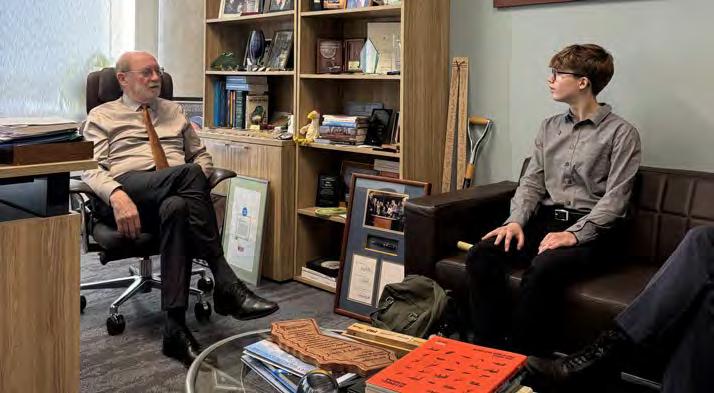
about the initiative’s messaging and approach to take. Selby shared how they have found support from their teachers at school but have had to deal with classmates heckling them in the hallways due to their androgynous look.
“I’ve mostly been dealing with bullying at school and just feeling very othered,” said Selby. “My teach-
ers have been a huge help but definitely the kids at school – there is a lot of yelling in the hallways, stuff like that, offensive stuff.”
Seeing their experiences reflected in the messaging concepts and brand ideas for the campaign “was cool,” said Selby.
See page 9 >>
by Matthew S. Bajko
Surrounded by dozens of Bay Area political and civic leaders, LGBTQ families gathered Friday morning at the California State Building in San Francisco to denounce the executive orders Republican President Donald Trump has issued attacking the rights and health care of queer and transgender youth. Among them was nonbinary 15-year-old Kanoa Wilson.
For the teenager, it was the first time they had so publicly come out to discuss their gender identity.
While shocked that a plurality of Americans had elected Trump last November to a second term fully aware of his anti-LGBTQ stances and other discriminatory positions, Wilson said it was important for people not to be completely disheartened and remain silent.
It was why they and their mom, Minda Murphy, a queer single parent, decided to speak out at the January 31 news conference. For Wilson, they wanted to serve as a role model to younger children questioning their gender identity or sexual orientation.
“I am Kanoa Wilson. I use they, them pronouns. This is how it is going to be,” Wilson told a phalanx of journalists and community members in the audience.
Murphy, 47, said the Oakland residents were fully aware their speaking out in such a manner would likely subject them to public harassment from those supportive of Trump’s actions. Nonetheless, she said she could not remain silent amid the White House’s attempts to deny her child access to their health care and diminish their humanity.
“I would be foolish not to be,” Murphy replied when asked if she was scared about taking such a public stance against the president. “But my family is a direct target.”
She called out Trump for not leading with compassion or valuing the rights of all Americans.
“He leads with hatred, fear, and intimidation,” said Murphy.
Another East Bay family with a transgender son in elementary school also spoke out against Trump’s anti-LGBTQ actions. Fearful of the reaction their family could receive, wives Sophia and Nikki declined

support of her nonbinary child Kanoa Wilson, left, during a January 31 news conference in San Francisco in support of trans students.
to provide their last names or the name of their child.
“He is a bright light in this world, and I am in awe of him every single day,” said Sophia of their son. “I will never stop protecting that light, nurturing it, and ensuring it shines as brilliantly as it was meant to.”
She called it “cruel” for Trump to try to prevent her child and others from accessing lifesaving health care affirming of their identities and to attempt to deny them the right to safely exist in the world.
“I am terrified,” she said, “that my son’s light, the warmth, the joy and the confidence he has in who he is, will be dimmed by a world that refuses to see him. That these executive orders, these cruel policies targeting transgender youth will strip away the very things that make him feel safe and whole.”
The executive orders issued by Trump are not “abstract debates,” added Sophia, but have “real devastating consequences” for her child and others like him.
If they are carried out, she worries that her son’s “right to exist as himself to receive the medical care he needs to move through life without shame or fear will be taken away from him by people who have never met him … who do not know the weight of what they are doing.”
Earlier this week, Trump signed an executive order targeting federal funding of gender-affirming care for minors. It has resulted in a number of hospitals in various states pausing providing such care, as the Associated Press reported Thursday.
On Wednesday, Trump released an executive order targeting affirmative actions that schools across the U.S. have taken to support queer and transgender students, from teaching LGBTQ curriculum and providing gender-neutral bathrooms to honoring students’ preferred pronouns and names and allowing them to play on athletic teams regardless of the sex they were assigned at birth.
“My Administration will enforce the law to ensure that recipients of Federal funds providing K-12 education comply with all applicable laws prohibiting discrimination in various contexts and protecting parental rights,” wrote Trump.
In response to questions from the Bay Area Reporter, the California Department of Education said the order from the White House has no bearing on schools in the Golden State teaching LGBTQ curriculum as required under state education codes. It noted the federal government has no legal right to dictate what local schools teach.
“It is against federal law for the White House to dictate what educators can and cannot teach by threatening to defund essential public services for students,” stated Liz Sanders, the director of communications for the statewide education agency.
Aiming to address the concerns of LGBTQ students and families in the San Francisco Unified School District, Superintendent Maria Su, Ph.D., sent out a districtwide email Thursday reiterating her support for queer and trans students. She said the district will move forward with its plans to celebrate LGBTQ Pride in April and is looking forward to partnering with its newly formed advisory council specifically for LGBTQ families.
Su reiterated that support at Friday’s news conference, which was organized by gay state Senator Scott Wiener (D-San Francisco). The need for it was “just ridiculousness,” she noted.
by Matthew S. Bajko
Anew report estimates that roughly 266,000 LGBTQ+ young people and their families have uprooted their lives and left a state because of antiLGBTQ politics or laws. It is also detailing in stark relief the positive outcomes on the health and wellbeing of LGBTQ youth that state lawmakers can have when enacting policy.
The eight-page research brief was released January 22 by LGBTQ youth advocacy nonprofit The Trevor Project and the Movement Advancement Project used data sets from both organizations to draw its conclusions. It is the first time the two groups have utilized their data in such a way.
The report drew on the findings of Trevor’s 2024 U.S. National Survey on the Mental Health of LGBTQ+ Young People, which was based on the responses of 18,663 LGBTQ+ young people between the ages of 13 to 24 from across the country. And it incorporated MAP’s policy tally scores for all 50 states that it compiles based on what laws individual states have passed benefitting or target-
ing the LGBTQ community.
“Year over year has been a recordbreaking year for anti-LGBTQ bills. And the attacks continue to escalate,” said Logan Casey, a queer and transgender man who is MAP’s director of policy research. “The more we can do to illustrate the harm of those attacks, and on the flip side the positive impacts of good policy, I think the better it will be to help us communicate to the public, policymakers and beyond that policies matter in shaping everyone’s individual lives, and that is true for LGBTQ people as well.”
One of the key findings in the brief is that an overwhelming 90% of LGBTQ+ young people cited “recent politics” as having impacted their well-being. Among transgender and nonbinary youth, the percentage was 94%.
Nearly half (45%) of the transgender and nonbinary young people reported considering moving to a different state because of their home state’s LGBTQ+ politics or laws. Among all LGBTQ+ youth, just 39% had done so.
“When we incorporated the MAP data, I was not surprised, but it was striking. It was very clear to me the data


had a very clear relationship to how LGBTQ-related policy is related to relocation,” said Steven Hobaica, Ph.D., a Honolulu-based licensed clinical psychologist who is a research scientist at The Trevor Project.
According to the research brief, titled “How State Policy Affects the Well-Being and Relocation of LGBTQ+ Young People,” 12% of transgender and nonbinary youth said they had traveled to another state to receive medical care due to their own states’ policies. Among all LGBTQ+ young people, 9% reported doing so.
Twenty-seven percent of LGBTQ+ young people reported living in a state with a negative policy index, or within a particularly harmful policy environment, according to the brief. Unsurprisingly, LGBTQ+ young people in states that received a lower LGBTQ+ policy index from MAP, meaning their states have less LGBTQ+-affirming policy, were more likely to consider moving and to travel to another state to access health care, compared to those resid-
NOW ACCEPTING APPLICATIONS FOR FAMILY UNITS ONLY MEI LUN YUEN APARTMENTS
NOW ACCEPTING APPLICATIONS FOR FAMILY UNITS ONLY
NIHONMACHI TERRACE APARTMENTS
MEI LUN YUEN APARTMENTS
ing in states that have adopted more LGBTQ+-affirming policy.
“For me, I think sometimes when individuals approach policy surrounding a community they are not a part of, they often don’t understand the impacts it can directly have on that community.
I hope it points to that,” Hobaica, who identifies as a member of the LGBTQ+ community, said of the research brief.
The Trevor project did not ask the youth what states they had moved to in order to find a more LGBTQ-welcoming legislative environment. It remains unclear how many LGBTQ youth and their families have relocated to California, one of a handful of states to declare itself a transgender sanctuary, to escape the anti-LGBTQ laws adopted in their former states.
Kathie Moehlig, executive director of Trans Family Support Services, told the Bay Area Reporter that her San Diego-based organization two years ago routinely had fielded calls from LGBTQ families wanting to move out of their states due to anti-LGBTQ laws, especially when it came to health care for their trans children. More recently, they have handled far fewer requests for such assistance.
“Most people who sat in a privileged position and could move out of state for care have done that,” said Moehlig, whose 24-year-old son is trans.
because Missouri is his home, he grew up in Ferguson, outside St. Louis, and he can still access the health care he needs.
“What me and other trans people are watching is whether the state or the new Trump admin will cut off medical care. That is the line in the sand for many people who either choose to move or have to move,” said Casey.
While the media’s and public’s attention are usually focused on the negative LGBTQ policies being adopted, and the impacts they have, what often goes missing from the discourse is how LGBTQ people, particularly young people, positively benefit when policymakers adopt affirming legislation, noted Casey. The research brief intentionally highlights those outcomes, noting LGBTQ+ young people are more likely to report being positively impacted by recent politics if they live in a state assigned a higher LGBTQ+ policy index by MAP.
“LGBTQ+ young people living in states with a higher LGBTQ+ policy index reported that recent politics were less likely to negatively impact their wellbeing. They were also less likely to report crossing state lines for health care or consider moving to another state,” noted the research brief.
February 10 – 13, 2025
945 Sacramento Street, San Francisco, CA
945 Sacramento Street, San Francisco, CA
FEBRUARY 10th TO FEBRUARY 13th, 2025
FEBRUARY 10th TO FEBRUARY 13th, 2025
Nihonmachi Terrace is an Affordable Low-income Housing property located at 1615 Sutter Street, San Francisco, CA 94109 with access to MUNI.
Trump impact uncertain
Mei Lun Yuen Apartments is an Affordable Low-income Housing property located at 945 Sacramento Street with access to MUNI.
Mei Lun Yuen Apartments is an Affordable Low-income Housing property located at 945 Sacramento Street with access to MUNI.
Nihonmachi Terrace have 1 bedroom, 2-bedroom, 3-bedroom and 4-bedroom family apartments. Building amenities include a laundry facility, community room and lounge located area as well as a Residents Services and Activities for residents who wish to participate.
Mei Lun Yuen Apartments has family apartments (3 bedroom & 4 bedroom). Building amenities include a laundry facility, community room as well as a Residents Services and Activities for residents who wish to participate.
Mei Lun Yuen Apartments has family apartments (3 bedroom & 4 bedroom). Building amenities include a laundry facility, community room as well as a Residents Services and Activities for residents who wish to participate.
She has not seen any numbers on how many such families have moved to California, but surmised relatively few have due to the high cost of housing in the state and other factors. What impact the Trump administration and its attacks on trans rights will have on such relocations remains to be seen, she added.
Casey told the B.A.R., “It is not just bad policies lead to bad outcomes, it is the reverse is also true. Good policies lead to improved outcomes for mental health and all other kinds of outcomes.”
Shira Berkowitz, senior director of public policy and advocacy at PROMO, Missouri’s statewide LGBTQ advocacy group, believes the research brief will be beneficial to the lobbying efforts it and similar groups in other states undertake this year.
All potential residents must qualify based on projected annual income, household size, criminal and rental history and one qualified person. Please refer to the maximum income limits below:
All potential residents must qualify based on projected annual income, household size, criminal and rental history and one qualified person. Please refer to the maximum income limits below.
All potential residents must qualify based on projected annual income, household size, criminal and rental history and one qualified person. Please refer to the maximum income limits below.
These income limits are adjusted periodically by the US Department of Housing and Urban Development. All households will pay 30% of their combined monthly adjusted income for rent.
These income limits are adjusted periodically by the US Department of Housing and Urban Development. All households will pay 30% of their combined monthly adjusted income for rent.
These income limits are adjusted periodically by the US Department of Housing and Urban Development. All households will pay 30% of their combined monthly adjusted income for rent.
For more information or to pick up a pre-application for Mei Lun Yuen Apartments, please go to 945 Sacramento Street, San Francisco between the hours of 9:00AM to 4:00PM from February 10th to February 13th, 2025. Deadline for application submission is February 21, 2025
For more information you may pick up a pre-application for Nihonmachi Terrace, please go to 1615 Sutter Street, San Francisco between the hours of 9:00 AM to 4:00 PM on February 10 - 13, 2025. Deadline for application submission is February 21, 2025.
For more information or to pick up a pre-application for Mei Lun Yuen Apartments, please go to 945 Sacramento Street, San Francisco between the hours of 9:00AM to 4:00PM from February 10th to February 13th, 2025. Deadline for application submission is February 21, 2025
“With Trump, maybe more families will move. More likely families will be hunkering down, finding resources, staying connected to community, and staying engaged in what may be coming our way,” said Moehlig. “We really don’t know. We just have to wait and see.”
The researchers noted that only 4% of LGBTQ+ young people in the sample they used had reported leaving a state because of LGBTQ+-related policies.
Using estimations that 9.5% of youth age 13 to 17 and 15.2% of young people age 18 to 24 in the U.S. are LGBT, they then deduced the 266,000 number for how many have relocated to a new state.
“We do significant policy work to change the landscape in this area so people feel Missouri is a state they can live and thrive in,” said Berkowitz, noting that “the most important thing to most lawmakers is the condition or ability for their state to thrive, or it should be.”
Hopefully the research brief will embolden lawmakers who want to help protect the LGBTQ community, said Casey.
“I hope it adds to the growing body of evidence that harmful policies have real costs on LGBTQ young people and their families across the country, but also that it will encourage legislators in states who want to do something proactive that they should,” said Casey.
You may also call (415) 445-2167 to receive a pre-application and instructions between February 10 - 13, 2025.
You may also call (415) 677-7977 to receive a pre-application and instructions between February 10th – 13th, 2025.
“Unsurprisingly, these issues are even more pronounced for trans and nonbinary youth,” said Hobaica. “It impacts the whole LGBTQ community, but especially trans and nonbinary youth are going to be the youth who feel the most impact and typically are attacked the most by policymakers.”
If you need language assistance or you have a disability that prevents you from fully participating in this process please call (415) 445-2167 by February 13, 2025 to receive a pre-application and instructions by mail.
If you need language assistance or have a disability that prevents you from fully participating in this process, please call (415) 677-7977 by February 13, 2025 to receive an application and instructions by mail.
You may also call (415) 677-7977 to receive a pre-application and instructions between February 10th – 13th, 2025.
The John Stewart DRE #00654505
If you need language assistance or have a disability that prevents you from fully participating in this process, please call (415) 677-7977 by February 13, 2025 to receive an application and instructions by mail.

The John Stewart DRE #00654505

In Missouri, where Casey lives, LGBTQ rights have been under assault. It has a negative rating on MAP’s policy tally, with an over score of -1.5/49.
“Politicians here are playing games with LGBTQ people’s lives, in particular LGBTQ young people’s lives,” said Casey.
He has had friends leave the state for Minnesota, California, and Pennsylvania. Casey told the B.A.R. he had contemplated doing so himself but hasn’t yet
For Moehlig, she would like to see pro-LGBTQ lawmakers make an effort to reach LGBTQ young people where they are at. It is not enough to just pass laws and talk about doing so at events, in media outlets, or on social media platforms that may not be reaching LGBTQ youth, contended Moehlig.
“I don’t think it is spoken enough in spaces where kids are going to hear that,” she said. “They need to be reaching in to where they are, whether on social media or whether communicating through their schools. They need to be finding those spaces so kids are hearing directly from the people who hold the power to say, ‘We’ve got you here.’” t

by Cynthia Laird
Leaders of the American Bar Asso-
ciation told LGBTQ attorneys and others that they will not retreat from diversity efforts at the national legal organization. The comments came in Phoenix February 1 where the association was having its mid-winter meeting and presented its prestigious Stonewall Award to three LGBTQ people.
“Today, when attacks on DEI are front and center, the gathering for the Stonewall Awards underscores the ABA’s commitment to diversity,” said William “Bill” Bay, the ABA’s outgoing president, referring to diversity, equity, and inclusion initiatives that the Trump White House is quickly eliminating in the federal government.
“We are not retreating ... and celebrate diversity in all its forms. You can count on the ABA to be a strong voice in support of the LGBTQ community.”
The ABA’s Commission on Sexual Orientation and Gender Identity, or SOGI, oversees the organization’s Stonewall Awards, which have been given annually for the past 13 years. The award is named after the famous riots in June 1969 in New York City where LGBTQ people stood up to police raiding the Stonewall Inn, a gay bar. The riots are widely considered to be the birth of the modern LGBTQ rights movement.
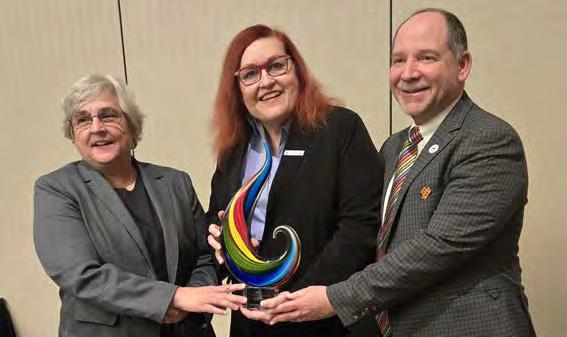
This year’s 14th annual presentation saw awards presented to lesbian attorney Kristen Galles; Alameda County Superior Court Judge Victoria Kolakowski, a transgender woman; and Los Angeles County Superior Court Judge D. Zeke Zeidler, a gay man. Michelle Behnke, a Black woman who is president-elect of the ABA, echoed Bay’s remarks when she spoke to attendees at the reception for the Stonewall Award recipients, held at the Sheraton Phoenix Downtown Hotel.
“We’re not going back,” said Behnke, who will assume the ABA presidency in August. “As DEI becomes a political football, the ABA will continue to fight for all LGBTQ people.”
She thanked the SOGI Commission and told the audience that its presence “shows allyship.”
Alpha Brady, a Black woman who is executive director of the ABA, also spoke.
“It’s appropriate that Stonewall is one of the cornerstones of the midyear meeting. It’s about leaders’ fight for equality. I’m inspired by your contributions. It reminds us that progress is possible,” Brady said. “Congratulations to our honorees.”
Nathan Bruemmer, a trans man who is an ABA SOGI commissioner, introduced the three award recipients. Bruemmer, who is an attorney in St. Petersburg, Florida, described the current national environment as a “time of crisis.”
“The rule of law has been disparaged by partisan loyalty ... above democracy,” he said.
Galles has represented students in Title IX equal protection or gender equity and sexual harassment cases against school and state athletic associations since 1996. She has litigated and supported groundbreaking cases and efforts for equity throughout her career. From influencing Title IX case precedent to arguing or writing briefs on Title IX, Galles is now a mentor for other lawyers on their Title IX cases.
She has also served in various roles in the ABA Section of Civil Rights and Social Justice and the Labor and Employment, Litigation and Business Law sections.
During her remarks, Galles thanked members of the SOGI commission.
“I was a little bit surprised when I got the call,” she said.
She discussed the importance of her work on Title IX and in the civil rights and social justice section and noted she was proud to serve as a mentor to other lawyers on their Title IX cases. (Title IX is a landmark federal civil rights law in the United States that was enacted as part of the Education Amendments of 1972. It prohibits sex-based discrimination in any school or any other education program that receives funding from the federal government; the Trump administration announced Friday that it had ended the Biden administration rules that extended Title IX protections to students on the basis of gender identity, as the Bay Area Reporter reported Friday.
Galles co-wrote the ABA’s Supreme Court amicus brief in Jackson v. Birmingham, Alabama Board of Education and wrote the ABA’s official commentary on the final report issued by the U.S. Department of Education’s 2002-2003 Title IX Commission.
Kolakowski, who is married to B.A.R. news editor Cynthia Laird, was elected to the Alameda County bench in 2010 and currently handles civil cases. During her remarks, she recalled past discrimination she experienced as a trans woman, including that after graduating from law school at Louisiana State University she was not allowed to take the bar exam because of her gender identity. (She appealed to the Louisiana Supreme Court and won, then passed the bar exam.)
“I never gave up and never tried to hide who I was,” she said. “I’ve tried my best to advocate on behalf of my community.”


Since taking office January 20, Trump has issued several executive orders targeting the trans community. These include that the federal government will only recognize two genders – male and female – and declares a person’s gender is defined at conception. He signed an executive order targeting federal funding of gender-affirming care for minors. And he issued an executive order that calls for eliminating “all federal funding or support for illegal and discriminatory treatment and indoctrination in K-12 schools, including based on gender ideology and discriminatory equity ideology and protecting parental rights.”
The president also issued an executive order banning trans people from serving in the military.
“The trail is being covered up behind me,” Kolakowski said. “Over the past 12 days, there’s been an attempt to create a new reality where I do not exist, where nonbinary people do not exist. Many, many people are terrified now.
“Before, I thought ‘we’ll get through this.’ I still think that,” she said. “No person by a signature on a piece of paper makes people disappear. It’s most important that the rule of law will save us. All the things I learned about in law school are protected by the people in this room.”
Zeidler spoke about his identity as a gay Jewish man and the importance of coming out. In 2004, Zeidler became the first openly gay man elected to a Los Angeles County judgeship. He had previously been appointed a juvenile court referee in 1998, according to the county court’s website.
“LGBTQ history is not that big and long,” he said. “My husband, Jay [Kohorn], was a lawyer when gay men could be arrested in bars for kissing.
“Fighting oppression is an agent of social change. I was in the gay community during AIDS. I grew up Jewish,” he said. “It was the [Barack] Obama campaign that taught people to tell their stories. The marriage equality movement taught people to tell their stories.”
Zeidler said that National Coming Out Day, held each October 11, “is also our allies coming out as allies.”
Then, addressing allies in the room, he added, “Right now, there are a whole lot of people relying on you to come out as allies.”
“Coming out is the greatest tool we have,” Zeidler said. t

Volume 55, Number 6
February 6-12, 2025 www.ebar.com
PUBLISHER
Michael M. Yamashita
Thomas E. Horn, Publisher Emeritus (2013)
Publisher (2003 – 2013)
Bob Ross, Founder (1971 – 2003)
NEWS EDITOR
Cynthia Laird
ARTS & NIGHTLIFE EDITOR
Jim Provenzano
ASSISTANT EDITORS
Matthew S. Bajko • John Ferrannini
CONTRIBUTING WRITERS
Christopher J. Beale • Robert Brokl
Brian Bromberger • Victoria A. Brownworth
Philip Campbell • Heather Cassell
Michael Flanagan •Jim Gladstone
Liz Highleyman • Brandon Judell • Lisa Keen
Philip Mayard • Laura Moreno
David-Elijah Nahmod • Mark William Norby
J.L. Odom • Paul Parish Tim Pfaff
Jim Piechota • Adam Sandel
Jason Serinus • Gregg Shapiro
Gwendolyn Smith • Charlie Wagner
Ed Walsh • Cornelius Washington • Sura Wood
ART DIRECTION
Max Leger
PRODUCTION/DESIGN
Ernesto Sopprani
PHOTOGRAPHERS
Jane Philomen Cleland
Rick Gerharter • Gooch
Jose A. Guzman-Colon • Rudy K. Lawidjaja
Georg Lester • Rich Stadtmiller
Christopher Robledo • Fred Rowe
Shot in the City • Steven Underhill • Bill Wilson
ILLUSTRATORS & CARTOONISTS
Christine Smith
VICE PRESIDENT OF ADVERTISING
Scott Wazlowski – 415.829.8937
NATIONAL ADVERTISING REPRESENTATIVE
Rivendell Media – 212.242.6863
LEGAL COUNSEL
Paul H. Melbostad, Esq.


Bay area reporter
44 Gough Street, Suite 302 San Francisco, CA 94103
415.861.5019 • www.ebar.com
A division of BAR Media, Inc. © 2025
President: Michael M. Yamashita
Director: Scott Wazlowski
News Editor • news@ebar.com
Arts Editor • arts@ebar.com
Out & About listings • jim@ebar.com
Advertising • scott@ebar.com
Letters • letters@ebar.com
Published weekly. Bay Area Reporter reserves the right to edit or reject any advertisement which the publisher believes is in poor taste or which advertises illegal items which might result in legal action against Bay Area Reporter. Ads will not be rejected solely on the basis of politics, philosophy, religion, race, age, or sexual orientation.
Advertising rates available upon request.
Our list of subscribers and advertisers is confidential and is not sold. The sexual orientation of advertisers, photographers, and writers published herein is neither inferred nor implied. We are not responsible for unsolicited manuscripts or artwork.
It was shocking to see the news that Children’s Hospital Los Angeles, or CHLA, on Tuesday stated it is pausing the initiation of gender-affirming hormonal care for trans patients under the age of 19 because it needs to assess President Donald Trump’s executive order from January 28 targeting such care for young people. The hospital already has an existing pause on gender-affirming surgeries for minors. A hospital official did state that patients already on hormonal care may continue their treatment, the Los Angeles Times reported.
The development mirrors decisions made by hospitals in other parts of the country, including Colorado, Virginia, and Washington, D.C. The Associated Press reported that Denver Health stated it would pause all surgeries; it wasn’t clear whether the hospital would continue providing hormonal treatment, according to the news service. Virginia Health and Children’s Hospital in Richmond has stopped medication and surgeries, AP reported. Children’s National Hospital in Washington, D.C. stated it’s paused prescriptions of puberty blockers to people under 19. It already did not provide surgeries, the news service noted.
CHLA appears to be the first hospital in the Golden State to pause medications for genderaffirming care. A search of the websites for Kaiser Permanente and Benioff Children’s Hospitals (in Oakland and at UCSF) found they had information on gender-affirming care available, including making appointments. Unfortunately, that might not be the case for much longer.
In related news, CalMatters reported that St. John’s Community Health in Los Angeles stated it is losing federal funding for providing gender-affirming care. The news site reported that St. John’s said the Centers for Disease Control and Prevention terminated a $1.6 million grant for its transgender health and social services program on January 31. The grant was funded through the CDC’s HIV prevention program, so that gives us an idea about how dire things will become. More than 500 people received services annually, according to CalMatters. St. John’s said it will not stop services and is preparing to sue over the withholding of federal money.
medical complications, a losing war with their own bodies, and, tragically, sterilization.
“Accordingly, it is the policy of the United States that it will not fund, sponsor, promote, assist, or support the so-called ‘transition’ of a child from one sex to another, and it will rigorously enforce all laws that prohibit or limit these destructive and life-altering procedures,” the order stated.
Our allies, however, are taking action. New York state Attorney General Letitia James on Monday told hospitals to continue providing gender-affirming care for people under 19 or they would run afoul of state anti-discrimination laws, AP reported. On Wednesday morning, California Attorney General Rob Bonta issued a statement with a coalition of 14 state attorneys general, including James, to protect access to gender-affirming care.
“As state attorneys general, we stand firmly in support of health care policies that respect the dignity and rights of all people. Health care decisions should be made by patients, families, and doctors, not by a politician trying to use his power to restrict your freedoms,” the statement read. “Gender-affirming care is essential, life-saving medical treatment that supports individuals in living as their authentic selves.
“The Trump administration’s recent executive order is wrong on the science and the law. Despite what the Trump administration has suggested, there is no connection between ‘female genital mutilation’ and gender-affirming care, and no federal law makes gender-affirming care unlawful. President Trump cannot change that by executive order,” the statement continued.

Trump used harsh language in his executive order, starting with the title, “Protecting Children from Chemical and Surgical Mutilation.” “Countless children soon regret that they have been mutilated and begin to grasp the horrifying tragedy that they will never be able to conceive children of their own or nurture their children through breastfeeding,” the order stated. “Moreover, these vulnerable youths’ medical bills may rise throughout their lifetimes, as they are often trapped with lifelong
Bonta’s statement pointed to a federal court victory last week, which “directed the federal government to resume funding that had been frozen by the Trump administration,” the statement read.
“In response to the court’s order, the Department of Justice has sent a notice stating that ‘federal agencies cannot pause, freeze, impede, block, cancel, or terminate any awards or obligations on the basis of the [Office of Management and Budget] memo, or on the basis of the president’s recently issued executive orders.’ This means that federal funding to institutions that provide gender-affirming care continues to be available, irrespective of President Trump’s recent executive order. If the federal administration takes additional action to impede this critical funding, we will not hesitate to take further legal action.”
Equality California, the statewide LGBTQ rights group, called the action by CHLA “alarming.”
by Dwayne Ratleff
The plane made its final descent into San Francisco. As it passed over the San Mateo Bridge, I stomped my feet in excitement in a feeble attempt to force the plane to land faster. At the time it felt magical that even when traveling by plane, I still had to cross a bridge to enter San Francisco.
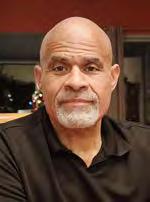
The red-eye flight landed at 1:50 a.m. Bartenders all over the Bay Area were shouting out, “Last call.” Taxicabs were lining up at bars to pick up drunk, generous patrons, leaving the tight wallet red-eyed ones to fend for themselves for another hour. BART, the Bay Area Rapid Transit system, didn’t run to the airport back then. The Airporter bus to the city cost $6 but didn’t start running until 5:30 or 6 a.m.
The bus stop for the Airporter was in the Tenderloin at the corner of Taylor and Ellis, across the street from Glide Memorial Church. I stepped off the bus in front of a wooden shed in the center of an asphalt lot. Despite its crimeridden reputation, the Tenderloin had some of the most elegant buildings in San Francisco. The shed was like a peasant that sat among royalty, and I sat in the shed waiting for the dawn to breach their crowns.
Around 7:30 a.m., carrying my suitcase in one hand, an iron and portable radio in the other, I started looking for residential hotels. I hadn’t slept for almost 24 hours. My eyes were red and puffy. They called those night flights red-eye for a reason. There was a leftover Coca-Cola stain on my white T-shirt from the turbulence. Everything about me screamed I couldn’t pay the rent.
“It is alarming that Children’s Hospital Los Angeles has paused providing healthcare to incoming transgender patients due to Trump’s executive order,” stated EQCA Executive Director Tony Hoang, a gay man. “Decisions about medical care for young people should be made between doctors and families – not by politicians like Donald Trump. Every American, including transgender youth, has the right to access healthcare free from discrimination, and California law protects the families seeking this care and the medical professionals who provide it.
“Denying or delaying care has dangerous consequences for transgender young people and their families – and we strongly believe hospitals and providers in California must continue to fulfill their ethical and legal duty to care for their patients,” Hoang added. “Every major medical association agrees that transgender health care is essential and that transgender youth and their families should be able to access medical care and make their own medical decisions with doctors –not the government.”
Hoang added that the American Civil Liberties Union, Lambda Legal Defense and Education Fund, PFLAG, and the Gay Lesbian Medical Association have filed a lawsuit in the federal District Court of the District of Maryland to challenge Trump’s executive order on trans youth, which he called “discriminatory and unconstitutional.”
“We are hopeful the executive order will be halted and overturned, restoring essential healthcare rights to transgender youth nationwide,” Hoang stated.
CHLA should rescind its recent action pausing medication treatment for gender-affirming care in light of the court order Bonta and the other attorneys general reference. Or, if the hospital fails to do so, Bonta should initiate legal action of his own given California’s strong anti-discrimination laws and having declared itself a sanctuary state for trans people.
There’s a recurring theme to all of Trump’s executive actions, which, we should remind people, do not instantly go into effect. The tone of his orders makes it seem like they’re the law of the land, and that’s exactly what he wants people to think. His loyalists in the government are also acting quickly – look at what’s happened to people being kept out of the USAID offices – but when it comes to gender-affirming care and other such orders, we don’t see a reason why hospitals like CHLA need to pause medications. It should stand firm and wait for a definitive legal opinion. We urge CHLA to finish its assessment quickly and go back to providing the medication care for people under 19. t
Each rejection sent me lower and lower until I arrived at Seventh and Market. I was exhausted, anxious, and desperately searching for a place that would say yes. The places that said yes had late check-ins. My salvation came in the form of a vacancy sign in a window and below that a handwritten note announcing early check-in. If the room only had straw on the floor for a bed, I would take it.
The Federal Hotel, located at 1067 Market Street, was built just six years after the 1906 earthquake. It was a cheap hotel with economical, sturdy mid-century furniture that had been preserved with 20 years of cheap furniture polish and had a shared bathroom. The hotel did not pretend to be anything it wasn’t. Tourists who stayed there bought 10 postcards for a dollar, rode a cable car, went to Fisherman’s Wharf, then went home and talked about San Francisco for the rest of their lives. But I was here to stay.

Tired as I was, I needed a shower. The bathroom was a scene from “Psycho,” sans shower curtain. Pigeons were perched on the sill of an open window. It felt as if I was walking naked into a dark, ominous wet alley rather than a shower. Somewhat apprehensive and not wanting to turn my back on the entrance to the shower or the pigeons, I showered facing out. I took further precautions by shampooing the right side of my head with the left eye open. Then I shampooed the left half with the right eye open. Showering at the Hitchcock Hilton, I risked being pecked or stabbed to death. Or maybe it was a double feature, and I would suffer both fates. If anyone had seen me in the shower, they would have thought
I was crazy. Showering different halves of your head might be the early signs of a split personality. I had become the person to keep an eye on. My precautions were not unfounded or paranoid. The year 1980 was the most dangerous year in U.S. history for murder rates and San Francisco was just transitioning out of its San Fran Psycho years. The kidnapping of Patty Hearst by the Symbionese Liberation Army; the assassination attempt on Gerald Ford, the 38th president of United States; the Zodiac Killer; the Zebra Killers; the Trailside Killer; the Jonestown massacre; the assassinations of gay Supervisor Harvey Milk and Mayor George Moscone; and the gay riots were recent memories for San Francisco. If anything, I should have been more afraid. Instead, I washed away what little fear I had to begin my new life. t
Dwayne Ratleff, who lived in San Francisco for 40 years, is the author of the recently published “See, What Had Happened Was,” from which this is an excerpt, and the award-winning “Dancing to the Lyrics” (2020). He was born in Ohio but grew up in Baltimore and Connecticut. As a product of the segregated Baltimore school system, Ratleff did not learn to read or write until the age of 10. Overcoming the stigma of spending two years as a special education student, he quickly adapted and graduated high school with honors. He claims turning disadvantage into an advantage is art and employs it in every aspect of his life. He now lives in Palm Desert, California with his husband, Michael. For more information on “See, What Happened Was,” go to https:// tinyurl.com/5676wvet. Excerpt used with permission.
by Matthew S. Bajko
There are 481 days to go before the June 2, 2026 California primary, yet the field of LGBTQ candidates in state legislative races is already beginning to take shape. At least 13 out candidates have already pulled papers to seek either an Assembly or Senate seat next year.
And the list of out contenders is likely to grow as it gets closer to the March 6 deadline next year for candidates to file ahead of the primary election. Under the state’s open primary system, the top two candidates regardless of party affiliation will advance out of next spring’s contests to the fall ballot.
Already, Riverside City Councilmember Clarissa Cervantes, who is queer and bisexual, has launched a campaign for the 58th Assembly District seat. Last November, she fell short by 596 votes to succeed her lesbian older sister, Sabrina Cervantes, in the Inland Empire seat, likely hampered by the attacks she faced stemming from her arrest for drunken driving in 2023.
The elder Cervantes sibling won election to a four-year term representing the state Senate’s District 31. As for her former seat in the Legislature’s lower chamber, it is now represented by Assemblymember Leticia Castillo (R-Corona), who had worked as a mental health clinical therapist for Riverside County.
Castillo has already formed a campaign committee to seek reelection next year. Last month, Clarissa Cervantes announced her decision to run against the incumbent.


ported in December there are now 15 out of California’s 120 state legislators hailing from the LGBTQ community. The Statehouse is now at 12% out representation, an increase from the 2022 election that saw the Golden State’s Legislature become the first to have 10% of its membership be queer. (There are no transgender state lawmakers.)
Of the 15, 10 will be up for re-election in 2026. Lesbian Senator Caroline Menjivar (D-San Fernando Valley) will be seeking reelection to her Senate District 18 seat and reported having $435,248 banked for her campaign as of the end of last year.

“We deserve a representative in Sacramento dedicated to actionable solutions to make people’s lives easier, not culture wars or a selfserving agenda. I’m a fighter and as a longtime leader, businesswoman, and mom, I know the issues impacting our region’s workers, families, seniors, and youth,” she stated.
In San Diego County, bisexual San Diego City Councilmember Marnie von Wilpert (D) intends to seek the open Senate District 40 seat, as Senator Brian Jones (R-San Diego) will be termed out of office next year. Wilpert, who pulled papers last fall to form a Senate campaign committee, first won election to her council seat in 2020 and represents the northern neighborhoods of Rancho Bernardo, Scripps Ranch, Torrey Highlands, and Rancho Peñasquitos.
“When the Senate District 40 comes open in 2026, I see that our region has an opportunity we can’t miss to make San Diego County’s voice in the state Capitol even stronger,” von Wilpert told her local TV station FOX 5/KUSI last September. “I know I can make a big impact at the state level and make sure San Diego region’s voice is heard in Sacramento by doing a lot of what I’ve done at city council.”
In Los Angeles County, gay West Basin Municipal Water District board member Scott Houston (D) has pulled papers to seek the open Assembly District 66 seat, as Assemblymember Al Muratsuchi (D-Torrance) will be termed out in 2026. His Division IV seat on his water board overlaps with sections of the Assembly district, which includes El Segundo where he has lived for more than two decades.
Houston grew up in Torrance and for years served on the board of the city’s South Bay LGBTQ Center. He told the Bay Area Reporter February 3 that he is looking at officially launching his candidacy for the legislative seat in the coming months.
“We definitely filed the paperwork. I don’t know when we will launch just yet,” said Houston.
As the Political Notebook first re-
Gay Senator Steve Padilla (D-San Diego) plans to seek another term representing Senate District 40. He reported having $225,723.15 in his 2026 campaign account.
Both of the Assembly’s bisexual members, Alex Lee (D-San Jose) of District 24 and Sade Elhawary (DSouth Los Angeles) of Assembly District 57, have already pulled papers to form 2026 campaign committees. As have gay Assemblymembers Rick Chavez Zbur (D-Hollywood) of District 51, Mark González (D-Los Angeles) of District 54, Corey A. Jackson, Ph.D., (D-Perris) of District 60, José Luis Solache (D-Lynwood) of District 62, Carl DeMaio (R-San Diego) of District 75, and Chris Ward (D-San Diego) of District 78.
DeMaio’s election last year made him the first out Republican elected to the California Legislature. He is not an official member of the Legislative LGBTQ Caucus, which only lists the 14 out Democratic legislators on its website.
Last year saw a record 31 LGBTQ individuals, 12 of whom were women, run for either an Assembly or Senate seat on the March 5 primary ballot. For the general election, the list was pared down to 20 on the fall ballot.
Tom Temprano, managing director of external affairs for statewide LGBTQ civil rights organization Equality California, told the B.A.R. this week that it is expected that the affinity group for out legislators in the Statehouse will maintain its record membership total come the 20272028 legislative session.
“With the caveat November of 2026 is a long ways away, but in each of the past two election cycles we have seen the California Legislative LGBTQ Caucus grow and hit historic numbers, and given the strength of the incumbents running for reelection and the growing pool of candidates running for open seats, it feels like we are hopefully poised to at least meet, if not continue to grow, that historical number in the 2026 election cycle,” said Temprano, whose organization endorses and helps raise money for out legislative candidates.
Those out Democratic candidates on the 2026 ballot may also face ad-
vantages from the historical trend lines of the party not in power of the White House or Congress typically doing better during off-year elections. It could be doubly so next year with Republican President Donald Trump coming into his second term with GOP majorities in both congressional chambers.
“Conventional wisdom and history tell us that 2026 is going to be a strong year for Democrats across the country, including here in California,” said Temprano. “I think it is fair to say as voters see what a mess the Trump administration is, they will be looking for change at the federal level in these House races and state legislative races and even local races as well.”
EQCA hires gay YIMBY
Serving as the new development director for EQCA is gay San Francisco resident Joe Sangirardi. He began in the role Monday, as the B.A.R. was first to report.
Sangirardi had been serving in the same position for statewide housing advocacy organization California YIMBY. He also previously worked for national LGBTQ rights organization the Human Rights Campaign in development roles.
Last November, Sangirardi lost his bid for a seat on the board overseeing regional transit agency BART. He has been rumored to be eying a run in 2026 for what will be the open District 8 seat on the San Francisco Board of Supervisors, as it covers the Castro LGBTQ neighborhood where he lives with Jeff Riles, his husband of nearly 7 years who is director of energy markets at Microsoft.
Asked about such a candidacy, Sangirardi told the B.A.R. he had no comment during an exclusive interview January 31. He did say that a major reason for his wanting the job with EQCA is to ensure it has the financial resources to counter the anti-LGBTQ policies coming out of the Trump White House.
“To both fight against Trump’s policies here in California but also to give other states a vision for what progress can continue to look like at the state level,” Sangirardi, 33, said about why he found the job with EQCA attractive. t
Web Extra: For more queer political news, be sure to check http:// www.ebar.com Monday mornings for Political Notes, the notebook’s online companion. This week’s column reported on the lawsuit an LGBTQ elders service agency filed along with three other nonprofits against the Trump administration’s funding freeze.
Keep abreast of the latest LGBTQ political news by following the Political Notebook on Threads @ https://www.threads.net/@ matthewbajko and on Bluesky @ https://bsky.app/profile/politicalnotes.bsky.social.


and
to households in lottery rank order. Must be income eligible and must not own a home. Households must earn no more than the maximum income levels below:
65% of Area
person - $68,200; 2 persons - $77,950; 3 persons - $87,650;
One

by John Ferrannini
Queer
Jews who feel alienated from the wider community in the aftermath of the Israel-Hamas war have launched a new campaign against antisemitism. The kickoff event was held at Manny’s cafe in San Francisco’s Mission district January 27.
Queers Against Antisemitism is under the auspices of A Wider Bridge, a national nonprofit that seeks to link the American and Israeli LGBTQ communities. It includes an Instagram page and a website that contains information and a pledge people can take to “not tolerate hate for those who are different, simply because they are different.”
The group is also hosting happy hours, such as at the launch event, around the country. Its website noted that events are planned for Pride Month in June.
“A lot of queer Jews feel like they need safe spaces and that’s what we’re providing with Queers Against Antisemitism,” Dan Hadad, a gay Jewish man who founded the initiative with A Wider Bridge, told the Bay Area Reporter. “We’re working with local partners to create more programming, more spaces, more education, workshops.”
Hadad told the B.A.R. that the initiative was started because A Wider Bridge “heard from many queer Jews – especially younger voices – who feel alienated by both institutions and social circles within the community. In response, we launched Queers Against Antisemitism Happy Hours to create a safe, supportive space where queer Jews can connect, find solidarity, and feel a sense of belonging,” he said.
Several speakers at the event, which featured dozens of attendees packing Manny’s cafe, said that education is needed in the LGBTQ community to combat antisemitic attitudes that have risen since Hamas’ October 7, 2023 attack on Israel, and the subsequent IsraelHamas war.

looked on.
In mid-January, Israel and Hamas agreed to a ceasefire and hostage release deal negotiated by the outgoing Biden administration, representatives of now-President Donald Trump, Qatar, and Egypt. It is currently being implemented.
Asked if and how things have changed since the ceasefire, Hadad stated that, “Antisemitism has always existed, and sadly, it always will. While its volume may have decreased at times, the underlying narrative remains unchanged – loud and clear. We continue to witness a steady stream of antisemitic incidents across the country, reminding us that the fight against it is far from over.
“Many we’ve spoken to still don’t feel safe attending queer bars or events in San Francisco, a place that should be a haven for acceptance and solidarity,” he added. “Queer Jews never anticipated feeling so alienated from the very queer community they’ve long been part of.”
The current ceasefire came more than a year after the October 7, 2023, surprise attack by Hamas on Israel. Brigades broke out of the Gaza Strip – one of two Palestinian territories the United States government considers the Occupied Territories, and which is blockaded by Israel and Egypt – and killed 1,139 people in Israel in the worst massacre of Jews since the Holocaust. At the same time, Hamas abducted Israeli civilian hostages and kept them in Gaza. Israel responded to the Hamas attack with an extensive bombing campaign in Gaza and a ground invasion with the stated goal of destroying Hamas. That has led to the deaths of over 46,000 Palestinians, according to Gaza’s Hamasrun health ministry.
(The B.A.R. went to Israel as part of a press trip last year to cover how the war affected the LGBTQ community, Palestinians, and Israelis.)
NIHONMACHI TERRACE APARTMENTS
February 10 – 13, 2025
Nihonmachi Terrace is an Affordable Low-income Housing property located at 1615 Sutter Street, San Francisco, CA 94109 with access to MUNI.
Nihonmachi Terrace have 1 bedroom, 2-bedroom, 3-bedroom and 4-bedroom family apartments. Building amenities include a laundry facility, community room and lounge located area as well as a Residents Services and Activities for residents who wish to participate.
All potential residents must qualify based on projected annual income, household size, criminal and rental history and one qualified person. Please refer to the maximum income limits below:
These income limits are adjusted periodically by the US Department of Housing and Urban Development. All households will pay 30% of their combined monthly adjusted income for rent.
For more information you may pick up a pre-application for Nihonmachi Terrace, please go to 1615 Sutter Street, San Francisco between the hours of 9:00 AM to 4:00 PM on February 10 - 13, 2025. Deadline for application submission is February 21, 2025.
You may also call (415) 445-2167 to receive a pre-application and instructions between February 10 - 13, 2025.
If you need language assistance or you have a disability that prevents you from fully participating in this process please call (415) 445-2167 by February 13, 2025 to receive a pre-application and instructions by mail.

“I didn’t know any other gay people and so I snuck in to this gay bar, got kicked out immediately, the security guard pulled me up by my shirt – it was Rage in West Hollywood – but I had walked into my first gay bar and, as I learned over the years, a queer bar, a gay bar, is one of those sacred places that no matter who you are, no matter where you’ve come from, you can go in, you can get a drink and you can begin the adventure,” Yekutiel said.
But things changed for him after October 7, 2023 (at which time Yekutiel had been in Tel Aviv, Israel’s most populous city, as the B.A.R. contemporaneously reported). He talked about how, after he returned to San Francisco, he’d go out with gay political leaders San Francisco Supervisor Rafael Mandelman, who represents the Castro and District 8 and is now president of the board, and state Senator Scott Wiener (D-San Francisco), both of whom are Jewish.
Israel is the world’s only Jewish state, and, according to the Anti-Defamation League, reported instances of anti-Jewish harassment, vandalism, and assault skyrocketed from the start of the conflict to September 2024 increased 140%, which the group called a “totally unprecedented number.”
Bars became ‘spaces of anger’ during war
Manny Yekutiel, a gay Jewish man who owns the eponymous cafe where the Queers Against Antisemitism event took place, has faced protests himself at his business for his support for Israel.
Last October, “Zionists out of Frisco” was spray-painted on the cafe during an anti-Israel protest, KTVU-TV reported.
At the launch, Yekutiel said his father, an Orthodox Jewish rabbi, had immigrated to Israel from Afghanistan, and that he himself was from Los Angeles, where as a youth he figured he was gay “as soon as I saw the live-action ‘Hercules,’” he quipped.
“I had a bag packed in my closet with all of the things that I might need if my family were to find out that I was gay,” Yekutiel said. “I had my Social Security card, I had a change of clothes, I had some food, I had a couple books.”
Yekutiel recalled that when he still lived in the City of Angels, he went to his first gay bar.
February 28, 1952 – December 28, 2024

Richard Bolingbroke, artist and leatherman, died suddenly at home on December 28, 2024. He was 72.
Richard, born in Dorset, England on February 28, 1952, led an extraordinarily colorful life, which took him from activism as a young man in London’s Gay Liberation Front to ashrams in India and Oregon, where he formed lifelong friendships with friends from throughout the world, and found his spiritual path.
Diagnosed with HIV in 1989, he committed himself to pursuing a career as an artist. As treatments for the disease improved, he continued working, producing an enormous body of work, utilizing a wide variety of media and techniques. Art gave him a place to explore not only his creative skills but also a way to navigate life.

“I continue down that path,” he wrote in an artist’s statement, “bringing in collage alongside the drawing, eager to see where this will lead.” Richard was a man of outsized personality, driven to create, whether it was art, gardening, baking and canning, or sex. He served as president for numerous arts organizations, and was a founder of the Gay Artists Alliance and was active with many
“After coming back [from Israel], the hatred just became insurmountable and there was a period of time, about six or nine months ago, where any time [Mandelman], Scott [Wiener], or I went into a gay bar – maybe not any time but certainly a lot of times – people came up to us and screamed at us,” he continued.
“People came up to me at El Rio and said, ‘You don’t belong here. You have to leave. You’re not welcome here. You’re a murderer. You are a genocider.’”
Yekutiel reflected that it was “very sad” that LGBTQ spaces became “places of anger, of hatred.”
“All of us have our own individual story, our own reasons for being there,” he said, referring to LGBTQ bars and other spaces.
The hostility he reported had initially led Yekutiel to consider not holding the Queers Against Antisemitism event; he said he’d deleted the email requesting his cafe host it.
But at the end of the day he decided, “If I’m not going to feel safe hosting a Queers Against Antisemitism event, then who is? So I talked myself out of it.”
Pro-Palestinian groups express alternate points of view
The U.S. provides billions of dollars in military aid to Israel annually. Thenpresident Joe Biden, and Democrats at the state, local and national levels, faced
groups including San Francisco’s Artist Guild, Artspan Open Studios, STAR, and kept a studio at Hunters Point Shipyard. He served as president of several of these organizations. He worked with many AIDS nonprofits, donating his time, talent, and artwork.
One of Richard’s projects was assisting transgender queer artist Craig Calderwood with their huge murals for Harvey Milk Terminal 1 at San Francisco International Airport, as the Bay Area Reporter noted in an article last year.
“I can’t emphasize enough what a huge deal this mural is. To be part of the Milk terminal, which in itself is a major accomplishment, is enormous. For the SFAC to choose a nonbinary artist of Craig’s accomplishment was an act of bravery on their part. It’s an in-your-face piece of defiance of the cultural norms of the rest of the U.S., which are so threatened right now,” he said at the time, referring to the San Francisco Arts Commission. He leaves behind family including his husband of 34 years, Steve Gaynes; and loved ones Eric Burkett, Paul Johnson, Joe Faria, and Rob Callbeck. He is also survived by family in England: sister Sarah Morris, and nieces and nephews.
A celebration of life will be held at 1 p.m., Saturday, March 1, at his studio in Hunters Point Shipyard, 153 Galvez Avenue, in Building 101, Studio 1508. All who knew and loved him are encouraged to attend.
“It has been a really impactful experience to be part of the LGBTQ advisory and to see all the messaging concepts we have come up with for social media and all that,” said Selby. “I can see how much they can make a difference and how much they are tailored to LGBTQ people.”
The group rallied around the tagline of “This Is Me” for the initiative, though Selby was unaware of its connection to a song of the same title from the 2017 movie “The Greatest Showman” that became a queer and transgender anthem. They’d never seen the film or heard the music but liked how the phrase spoke to being true to yourself and not changing yourself to fit a label.
“It feels like a deep breath. This is me, this is who I am, and I am comfortable with myself. That’s what it feels like to me,” Selby said of the tagline.
They also felt it spoke to questions of “am I queer enough” that LGBTQ youth may be asking themselves.
“I think it was very relatable and accurately, like, was tailored to the experiences faced specifically by LGBTQ people, and it wasn’t all about the more, like, what you see in the media … the struggles you see in the media with coming out and bullying and gender dysphoria and struggles with that,” said Selby.
So, they were stunned to learn last month that the California Department of Public Health had abruptly canceled the LGBTQ+ Youth Mental Health Campaign ahead of its expected rollout this spring at Pride events around the state. LGBTQ lawmakers last year had secured more than $3 million in the state budget for it, and the state health agency’s Children and Youth Behavioral Health Initiative (CYBHI) had contracted with the LGBTQ-owned firm Change Craft last July to work on its creation and launch.
As the B.A.R. previously reported, CYBHI Director Dr. Sohil Sud at the California Health & Human Services Agency and new California Department of Public Health Director Dr. Er-

ica Pan informed the firm and LGBTQ advocacy groups that they felt the LGBTQ-specific campaign was too limited in scope and were rolling it into the $21 million statewide “Take Space to Pause” campaign launched in December and running through early 2026.
“I am definitely still kind of processing it all. But I think it would have been really powerful and impactful, and I think most likely more effective, to have an LGBTQ-specific campaign,” said Selby. “Just because so many of the issues we face are specific to our community and it is important to have a campaign that specifically targets those issues.”
Trump executive orders
With Republican President Donald Trump issuing a host of executive orders attacking the rights of queer and trans youth during the first weeks of his second term in late January, it crystallized for Selby the need for the initiative they were working on.
“It definitely is crazy. While I know there is no way for them to enforce them, it’s crazy to see executive orders that can directly affect me,” said Selby. “There was one about teachers being able to use students’ preferred pronouns. I was just like, ‘Wow, that can affect me directly if they can find a way to enforce that.”
A family friend whose own kids are also part of the LGBTQ community had called Selby’s mother in a panic last week about what the Trump administration’s executive orders would mean for their
children at school. The two families arranged to get together over the weekend to provide each other with support.
“OK, we just have to hope that our bubble of being in California is going to protect us right now. That is what we are counting on. That is the only thing keeping us remotely sane and safe,” said Selby’s mother.
(To protect them from being harassed by those supportive of the White House’s anti-LGBTQ policies, the family asked the B.A.R. not to disclose the city where they live or publish the name of Selby’s mother since she has a social media presence.)
The timing of the health department’s decision “was weird,” said Selby’s mother, coming a week prior to Trump’s inauguration on January 20. Selby also felt it came at “the worst possible time” due to the anxiety and fear LGBTQ people felt ahead of Trump’s second term with his repeated campaign pledges to target the rights of trans youth and adults.
“It felt like California was kind of abandoning the queer community right when we needed their help the most and right when it was more important than ever for them to stand by us,” said Selby.
The state health department has yet to make Pan, Sud, or any other staff member available for an interview with the B.A.R. to discuss their decision to end the LGBTQ youth mental health campaign or explain how its planned messaging will be utilized as part of the larger Take Space campaign aimed at
teaching young people how to deal with various stressors in their life, according to its website at https://takespacetopause.org/signs-of-stress.
Addressing the concerns about their decision raised by LGBTQ advocates and community leaders in recent weeks, Pan and Sud sent them a letter January 30 to further explain how they intend to incorporate the LGBTQ youth-specific mental health messaging into the more generically tailored Take Space campaign. They noted it also had been developed with input from LGBTQ advisers, including queer and trans teens, and will have a longer duration than the “This Is Me” campaign would have had.
“Like you, we share concern regarding the impact of recent rhetoric and actions by the incoming Federal Administration on the well-being of California’s LGBTQ+ youth. These activities underscore the imperative to support LGBTQ+ populations throughout the entire state for as long as possible,” wrote Sud and Pan. “The question before us is not if but how to best support LGBTQ+ teens with important information about stress management and stigma reduction in this critical time.”
In recent days the Take Space website has been updated to include specific LGBTQ resources that were not there when it launched late last year. For example, its resources page at https:// takespacetopause.org/resources now has a dedicated LGBTQ+ tab that lists five organizations focused on the LGBTQ community with links to their own websites, such as the Trevor Project and the Trans Lifeline.
Also listed is the California LGBTQ Health & Human Services Network. Its inclusion came as a surprise to the LGBTQ network, as it does not provide direct services but acts as a clearinghouse and advocate for LGBTQ nonprofits, service agencies and others across the state. Dannie Ceseña, the LGBTQ network’s first Two-Spirit and Native director, told the B.A.R. during a February 3 phone interview that no one from the state health department had spoken to them about listing their agency on the Take Space website.
“It doesn’t seem very well thought out to me. It just seems they are covering their bases,” Ceseña told the B.A.R. of the response so far from state health officials.
Also concerning to Ceseña has been seeing the health department take the research and work done by Change Craft and hand it off to the firm contracted to oversee the Take Space campaign, the Rescue Agency, which also happens to be LGBTQ-owned.
“If they are doing it to Change Craft, who else are they going to do this to in the future?” asked Ceseña.
Sounding the alarm
Since last month Ceseña has sounded the alarm about the cancellation of the LGBTQ-specific youth initiative and has asked other organizations and community leaders to call on the state health department to reverse course. They have also been asking for a meeting with leaders of the state agency to hear directly from them about their decision-making process regarding the LGBTQ+ Youth Mental Health Initiative and how it will be incorporated into the larger campaign.
To date, no such meeting has been scheduled, said Ceseña, who sent another letter to Sud and Pan on Tuesday reiterating their concerns and asking for more information about their plans moving forward. They stressed they want to work together strengthening “California’s leadership in LGBTQ+ mental health.”
Ceseña told the B.A.R. that, “Yes, I would love a direct sit down to get all of the questions answered and not just receive a general letter of what their plan is. They did leave a lot of questions unanswered.”
Statewide LGBTQ advocacy organization Equality California was among those that raised concerns with the state health agency. It remains ready to work with state leaders, the LGBTQ Legislative Caucus and CDPH “to increase support for lifesaving mental health resources and initiatives,” it told the B.A.R.
page 12 >>

















































































































































by John Ferrannini
San Francisco Pride doesn’t expect social media giant Meta will be participating in this year’s parade, the group’s executive director stated to the Bay Area Reporter January 30. However, the reason is not because of the recent uproar over the company ending fact-checking and the removal of long-standing hate speech policies on its social media platforms.
Meanwhile, another Pride organization in the Midwest dropped a major retailer as a sponsor and raised even more money in the aftermath.
In San Francisco, Pride Executive Director Suzanne Ford, a trans woman, stated in an email to the B.A.R., “We stand with the community in recognizing these recent changes as the backsliding they are,” but she explained that Meta did not participate in 2024’s San Francisco parade.
“Most or all of our internal contacts, queer employees, are gone,” Ford stated about the organization’s relationship with the company. “We don’t expect Meta to return to our celebration or parade in 2025.”
Ford stated that Meta last marched in the San Francisco Pride parade in 2023.
“There is not currently any proposed action for the board to vote or come to consensus on, and so it is unlikely that an open discussion on this issue will take place at any upcoming meeting,” Ford continued. “The board does review corporate participation annually, however, those discussions are often had at the committee level or in executive session as current and ongoing contracts may be discussed.”
Ford did welcome public comment at the meetings of the SF Pride board of directors. The next one is Wednesday, March 12, at 7 p.m.
Meta CEO Mark Zuckerberg on January 7 announced a loosening of the rules over hate speech and abuse on the platforms – which include Facebook
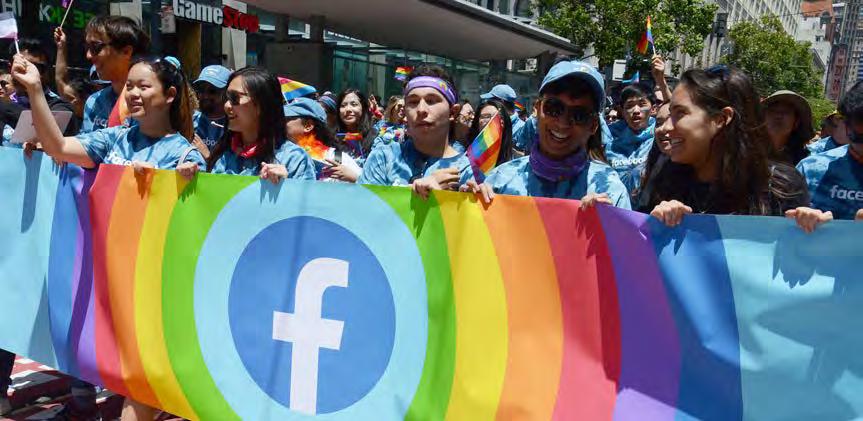
and Instagram – citing “recent elections,” the Associated Press reported.
Zuckerberg also dropped factchecking in favor of a “Community Notes” system that X installed after Elon Musk purchased the company formerly known as Twitter in 2022.
Meta did not respond to a request for comment regarding its participation in SF Pride.
In addition to Facebook and Instagram, Meta also owns Threads, Messenger, and WhatsApp.
Then-President Joe Biden called out Meta’s changes during his January 15 farewell address to the nation, in the section in which he warned about an “oligarchy taking shape in America of extreme wealth, power, and influence that really threatens our entire democracy, our basic rights and freedom,” and a “tech-industrial complex.”
Zuckerberg, a guest of honor at President Donald Trump’s inauguration, said on Joe Rogan’s podcast that Biden White House officials would “call up the guys on our team and yell at them … cursing and
threatening repercussions if we [didn’t] take down things that [were] true.”
As part of the policy changes at Meta, it clarified in its community standards that “we do allow allegations of mental illness or abnormality when based on gender or sexual orientation, given political and religious discourse about transgenderism and homosexuality and common nonserious usage of words like ‘weird.’”
The California Legislative Diversity Caucuses, including the California Legislative LGBTQ Caucus, condemned the changes in a news release January 22.
“It is abhorrent that such a policy allows for blatant misinformed, hateful rhetoric targeting our communities,” the caucuses’ joint statement reads. “Statements such as labeling women ‘personal property,’ LGBTQ+ individuals as ‘mentally ill,’ immigrants as ‘filthy,’ Jewish people as ‘greedy,’ and more are both dangerous and fuel hostile stereotypes that have been used to justify violence against our communities.”
The California Legislative LGBTQ caucus didn’t return a request for addi-
tional comment.
In an op-ed for the San Francisco Standard, gay state Senator Scott Wiener (D-San Francisco) – who has faced homophobic and antisemitic hate speech on social media, as well as threats of physical violence – called out Zuckerberg.
“Putting a target on LGBTQ people is wrong,” Wiener stated. “It’s a concerning sign of how willing some large companies are to scapegoat minorities in order to gain favor with authoritarian leaders. The real-world impacts of these policy changes will be enormous. When I was first targeted in 2020, the avalanche of QAnon-fueled death threats and abuse was intense. Many of them came through YouTube, which has limited content moderation.”
(YouTube is owned by Google.)
Wiener was asked about what he thinks of Meta at Pride events.
“We’re in a moment in time when people and corporations show us who they are,” he stated to the B.A.R. “Will they support LGBTQ people when it’s not politically convenient to do so?
Trump is consolidating power by demanding corporate loyalty to his extremist agenda, and Target and Meta folded like cheap tents. It’s a gut punch, but we’ll brush ourselves off and fight for our community’s survival without these fickle friends. And we will remember who stood with us when it mattered.”
Most recently, Meta agreed January 29 to pay $25 million as part of a legal settlement with Trump after the company shut down his accounts in the aftermath of the January 6, 2021 insurrection. NBC News reported that Meta spokesperson Andy Stone confirmed the terms: a $25 million payment from the company, with $22 million going toward a fund for Trump’s presidential library and the balance dedicated to legal fees and other plaintiffs in the case.
The settlement does not require Meta to admit wrongdoing, NBC News reported.
This year’s San Francisco Pride weekend takes place Saturday and Sunday, June 28-29, with the world-famous parade Sunday. The theme is “Queer Joy is Resistance.”
Target dropped in Minneapolis
The general backlash to diversity, equity, and inclusion – led by the Trump White House – has eviscerated programs at companies nationwide after Trump’s election – as quickly as the movement for racial justice in 2020 led to them blossoming.
After Minneapolis-based Target Corporation announced the end of some DEI policies January 24, Twin Cities Pride ditched the retailer, The Advocate reported.
Target had been a major corporate sponsor of Twin Cities Pride and the company had pledged $50,000, but the Pride organization quickly raised over $89,000 after the split, the LGBTQ publication reported. t







by John Ferrannini
Aformer UC Berkeley employee charged in the killing of a gay Black man in Oakland two years ago has been sentenced to 11 years in prison. The sentencing brings to a close the criminal case, though it leaves some questions unanswered.
Sweven Waterman, 40, of Oakland, pleaded guilty to voluntary manslaughter in the killing of Curtis Marsh, 53, also of Oakland. He was sentenced January 31 by Alameda County Superior Court Judge Kimberly E. Cowell in Department 11 of the Rene C. Davidson Alameda County Courthouse near Oakland’s Lake Merritt.
Marsh, who was also known as drag artist Touri Monroe, was a hair stylist and a Miss Gay Oakland emeritus who used to sing with the Oakland Gay Men’s Chorus. Originally from Iowa, friends described him as fun, helpful, and active in his church.
Alameda County Deputy District Attorney Colleen Claire Clark read written statements from Marsh’s family into the record.
“He was my nephew, which you have taken away from me,” Marsh’s aunt, Regina Brown, wrote.
Marsh’s mother, Jacquelyn Kersh, wrote, “Not only did you take my oldest son, you took someone who will be remembered as a caring, loving and giving person. … He will be greatly missed by many, but not forgotten.”
Waterman did not speak himself during the proceedings.
After the letters were read, Cowell reiterated that in terms of sentencing, “I can only work with what charges were brought and that was up to the former DA.”
Pamela Price, who was Alameda County’s district attorney when charges were filed, was recalled by voters last November. On January 28, Ursula Jones Dickson was appointed the new district attorney by the Alameda County Board of Supervisors. Jones Dickson is a former Alameda County Superior Court judge, who was sworn in as DA February 4. Cowell also said Waterman has to pay a restitution fund fine of $300. He can appeal a $12,000 claim to the victim’s compensation board in March if he so chooses, the judge said.
Members of the Marsh family who were present in court declined to speak with the Bay Area Reporter after they were approached.
Waterman’s attorney, David Briggs, also said he did not have any comment to add.
The Alameda County District Attorney’s office didn’t return a request for comment by press time January 31.
Previous hearing
By accepting the plea agreement, Waterman avoids a trial on the charges. Before that agreement was reached, the case was headed to trial after Alameda County Superior Court Judge Rhonda Burgess oversaw a preliminary hearing. She had ruled June 18 that the prosecution’s evidence was compelling enough to have Waterman stand trial after two days of hearing from witnesses for the prosecution. (https://www.ebar.com/story. php?ch=news&id=333893)
Neither side contested that Marsh was killed at his apartment on Vernon Street in the Adams Point neighborhood just before 8 a.m. March 4, 2023. During the preliminary hearing last year, Alameda County Deputy District Attorney Jake O’Malley conceded that “we may never know what events transpired in that apartment.” Nevertheless, he alleged that “for the purposes of today ... the defendant was in that apartment when Curtis was killed, and his DNA is on the weapon.”
The first to testify was Ariel Butler, one of the Oakland police officers who responded to Marsh’s home the morning of March 4. The Oakland Fire De-

partment was on the scene already, he said. (Neighbors had told KTVU-TV last year that the perpetrator set a fire and left the front door and gate open when running away.)
Butler said he’d spoken to a neighbor who “said there’d been multiple domestic violence incidents” in the past at the address. (Hearsay evidence is allowed at preliminary hearings.)
Oakland homicide Detective Kyle
Cardana said when he arrived he saw Marsh’s body with stab wounds on the balcony of the apartment, as well as a “bent knife on the ground.”
“At first glance ... there may have been some blood on the knife,” he recalled.
Cardana said that when he walked into the apartment it was “covered in an inch or two inches of water” due to overhead sprinklers, which were no longer on at the time he entered the apartment, though there was still a small fire “near a bar stool.”
Cardana said that, initially, Marsh’s male domestic partner, whom the B.A.R. is not identifying because he did not testify at the preliminary hearing, was taken into custody. However, the partner showed text messages that proved he was at a friend’s house in Emeryville from about 7:15 in the morning until after the time of the killing. He has not been charged.
“We believe the killing occurred between 7:30 and 7:52 hours in the morning,” Cardana said.
The partner returned after hearing from another friend that Marsh was injured.
Cardana testified that a neighbor told him that around 7:30 a.m. “she heard screaming, what appeared to be
so she ran to get her cellphone to call 911.”
Cardana said that as part of their investigation, police obtained a video showing a man arriving on a Lime scooter that morning after 5:17 a.m.
The court viewed the video, and another taken after the time believed to be the time of the killing, showing a man leaving the apartment.
Police obtained a subpoena for financial records from Neutron Holdings Inc., which owns the scooters. It showed a scooter ride in Oakland that started at 5:10 a.m. March 4 and was updated after 5:17 as being paid for by Waterman, Cardana said. After being contacted by police, Waterman gave a swab of his saliva to Oakland police.
Cardana said, “We determined there were at least one to two people inside the apartment at the time of the attack.”
During cross-examination, Briggs asked, “So, is it possible there were three people in the apartment at the time [Marsh] was attacked?”
Answered Cardana, “That is unknown.”
“So it is possible,” Briggs asked.
“It could be, yes,” Cardana answered.
Angela Freitas, a DNA evidence ex
hearing, saying that Oakland police sent her office several samples, including four different swabs from the knife, as well as a swab of DNA from Waterman.
O’Malley asked what she’d discovered. There was DNA from four people on the knife, she said. One sample showed that it was 660 octillion times more likely DNA came from Waterman and three unknown individuals than if it was from four unknown individuals, she said.
“For reference, an octillion has 27 zeros,” she added.
Briggs honed in on the fact that DNA from at least two other people, who were not Waterman or Marsh, was found on the knife, including one that Freitas determined to be from a male who could not be identified using the Combined DNA Index System, or CODIS, an FBI-run database of the DNA of convicted offenders, unsolved crime scene evidence, and missing persons. Briggs also had Freitas concede it is possible water damage could damage the reliability of the DNA evidence.
O’Malley had the chance to question Freitas again. She testified there is no way to know when DNA was left on any particular item. t

From page 1
Fear among school community
Nonetheless, Su said there is a lot of fear among the school community, for students, parents and educators, due to Trump’s executive orders. And while it remains unclear what their impact could be if implemented, Su said that SFUSD remains “committed to being inclusive and will not change.”
“We have never shied away from leading the charge in San Francisco when it comes to making sure our classrooms and schools are vibrant and welcoming spaces for our students to feel nurtured and seen,” said Su.
She said it was important for all students to know they will be welcomed at the city’s public schools.
“As a school district, as educators, and staff, we must wrap our arms around our LGBTQ and trans gender diverse students, communities and staff,” said Su.
Yet, as Su and other district staff were pledging their support for LGBTQ students, the U.S. Department of Education on Friday sent a “Dear Colleague” letter to K-12 schools and institutions of higher education advising educators and administrators that the federal agency’s Office for Civil Rights will enforce the Trump administration’s 2020 Title IX Rule. It effectively ends the Biden administration rules that extended Title IX protections to students on the basis of gender identity.
The department informed education
<< LGBTQ Jews
From page 8
intense pressure last year from some progressive Democrats and protesters to cut off that aid, or make it conditional on a ceasefire. Mass protests were held on college campuses, and politicians were interrupted at events by demonstrators.
The B.A.R. reached out to the groups Queers Undermining Israeli Terrorism! and Jewish Voices for Peace, which have organized protests against Israel, to ask their thoughts on the new A Wider Bridge initiative.
Deeg Gold, a lesbian and trans Jewish person who is part of QUIT!, said in a phone interview that the actions of some anti-Israel protesters do not speak for the whole, and that “you can see why people are upset with Gazans being killed every day.”
“This is not a conflict between Jews and Palestinians,” Gold said. “This is a conflict between Israeli imperialism, fostered first by the British, then by the United States against the Palestinian people.”
Gold emphasized that “queer people have historically been anti-imperialist” and have been “out in droves” support-
<< Engardio
From page 1
He is urging District 4 residents not to sign the recall petitions, also known as a decline to sign campaign.
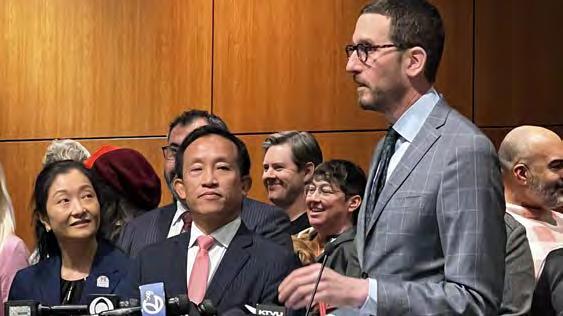
leaders that it plans to enforce Title IX protections on the basis of biological sex in schools and on campuses. It also advised its doing so “ends a serious threat to campus free speech” and will mean students have stronger due process protections during Title IX proceedings.
“The Biden Administration’s failed attempt to rewrite Title IX was an unlawful abuse of regulatory power and an egregious slight to women and girls. Under the Trump Administration, the Education Department will champion equal opportunity for all Americans, including women and girls, by protecting their right to safe and separate facilities and activities in schools, colleges, and universities,” stated Acting Assistant Secretary for Civil Rights Craig Trainor. It prompted an immediate response
ing the Palestinian people.
Wynd Kaufman, a straight ally with Jewish Voices for Peace and who is also Jewish, also commented.
“There are fringe elements on all sides, and of course, the media concentrate on them, but the vast majority of people there were speaking on the genocide going on and were not antisemitic,” Kaufman said, referring to the comments made at the Board of Supervisors meeting last year where the ceasefire resolution was discussed.
Kaufman continued that she felt proIsrael groups conflate antisemitism with opposition to Israel, and that though “there is antisemitism when that’s centered when there’s a genocide going on, there’s a problem.”
South Africa brought a case in late 2023 before International Court of Justice alleging that Israel is committing genocide in Gaza. A final ruling has not been handed down.
Tense past local meetings
Mandelman spoke at the January 27 launch event, bringing up the tense local meetings that occurred when resolutions calling for a ceasefire in the conflict came up for votes before elected govern-
SF Zoo at Sloat Boulevard to Skyline Boulevard due to the constant erosion of the roadway and diverting vehicular traffic around the zoo’s inland border.
from State Superintendent of Public Instruction Tony Thurmond, a vocal supporter of LGBTQ students who is a 2026 gubernatorial candidate. He reiterated that California schools will continue extending protections against discrimination to all students on the basis of gender, gender expression, gender identity, and sexual orientation.
“In California, ‘all’ still means all,” stated Thurmond. “While the Trump Education Department announced that they will no longer protect all students from discrimination, California law is unaffected by recent changes to federal policy, and continues to provide safeguards against discrimination and harassment based on gender, gender expression, gender identity, and sexual orientation. While federal guidance de-
ment bodies, including at the San Francisco Board of Supervisors last January.
“What you saw around that resolution was not just – surely there were some people who were concerned about the plight of the Palestinians – there were a whole bunch of people who just hated Israel, hate the idea of a Jewish state, and were there to express that in the most intimidating, scary way possible,” Mandelman said, referring to the resolution that the San Francisco Board of Supervisors ultimately adopted.
Then-mayor London Breed declined to sign the resolution, which passed 8-3. Though it specifically called out antisemitism, she noted that some advocating for the nonbinding measure during public comment engaged in “demonization, heartlessness and abject antisemitism.”
As examples, Breed stated that during a board meeting when a family member of October 7 victims was speaking, “people in the crowd made pig noises, devil horns with their hands, and screamed for him to ‘kill himself’ as he walked out of the chamber. Protesters surrounded a Jewish city employee in the restroom to intimidate him while he was doing nothing more than being present in his workplace.”
which runs to San Mateo County.
volves, our commitment to safeguarding the rights of all students persists.”
More state actions explored
Meanwhile, Wiener is looking at how to further expand California as being a sanctuary state for LGBTQ youth and their families. He had authored the 2022 law that designated California as a sanctuary state for trans students and their families who have seen access to genderaffirming care for youth be curtailed in their home states.
Now, he is exploring additional legislation to strengthen protections for all queer and trans youth in the Golden State. But he had few specifics to share at Friday’s news conference.
“The federal government is very powerful, but we will do whatever we can do to protect anyone who needs to be protected,” pledged Wiener.
He criticized Trump and his allies in Congress for using trans youth as scapegoats to go after and attack in hopes of distracting Americans from their other policies aimed at slashing health care access for those on Medicare and providing huge tax cuts to their wealthy donors. Such moves are straight out of an “authoritarian playbook,” noted Wiener.
“If Donald Trump and his authoritarian regime are going to come for our trans residents, they are going to have to come through us,” said Wiener, referring to the large assemblage of local leaders and LGBTQ community members who had joined him at the podium.
With City Attorney David Chiu by his side, Wiener said they don’t believe
Mandelman voted against the resolution along with gay District 6 Supervisor Matt Dorsey and then-District 2 Supervisor Catherine Stefani, a straight ally who is now in the state Assembly.
“It was a couple of Catholics on the Board of Supervisors … who were kind of the rocks,” Mandelman said, referring to the two who joined him in voting no.
“They stood up and he’s got his hat now to show for it.”
Mandelman was referring to Dorsey’s hat featuring the Star of David. Dorsey said he bought the hat after Jonathan Hirsch, an Oakland Jewish man, was reportedly asked to leave the Jerusalem Coffee House in Oakland for wearing the same hat, as KNTV-TV reported. Dorsey was also at the launch event.
“It felt personal to me as a gay man,” Dorsey said. “You don’t have to be Jewish to be a Zionist. … I always want to be there to be your ally.”
Mandelman said that individuals should be distinguished from the actions of governments, bringing up as an example the U.S. under Trump.
“We now have an American government that is wholly embarrassing to me. It causes me grief and distress as an American,” Mandelman said, referring
Trump has the legal authority to enact his anti-LGBTQ executive orders. He also expressed hope of seeing the state Assembly pass special legislation he authored to provide $50 million in state funds to respond to Trump’s actions in the courts, which it did Monday, February 3.
“We are not going to let you get away with it,” said Wiener, chair of the Senate Budget Committee. “We are going to have these kids’ backs, their parents’ backs, and their teachers’ backs.”
Chiu said his office is ready to take Trump to court should his executive orders be implemented. He said they are purposely written to be “quite vague” and cautioned they will not immediately take effect.
“My office is monitoring to see what happens. When we reach the point of them creating a harm to San Franciscans, we will consider all legal options at that time given the state of the law,” said Chiu, who said he found Trump’s focus on trans youth to be “creepy.”
A former state legislator who helped pass various pro-LGBTQ bills in Sacramento, Chiu noted there are numerous protections for trans and queer people in California.
“Regardless of what Trump says, transgender people under the constitution have a fundamental right to equal protection under the law. Our courts have recognized discrimination against our trans community is unlawful,” said Chiu. “He cannot simply order federal agencies to violate a law. As far as I know, we still live in a democracy, not a dictatorship.” t
to the second Trump administration, which took power January 20. “I continue to believe in this country. I believe in the idea of America. I think it’s worth fighting for. I continue to believe in Israel and believe Israel is an idea worth fighting for. Both places do some pretty bad stuff and do some things that are pretty embarrassing to me personally, and also that I have an obligation from my history, my family, my experience to try to better both places.”
Tyler “Tye” Gregory, a gay man who is the executive director of the Jewish Community Relations Council, was at the launch event and told the B.A.R. that LGBTQ people can teach the broader Jewish community a lesson about visibility.
“All of us have an opportunity to teach the Jewish community something about LGBTQ joy,” Gregory said. “We have pride, we’re out, we’re loud, and what I hear from too many Jewish community members today are feelings of ‘maybe we should go into the closet,’ ‘maybe we should be quieter about who we are.’ I’m going to challenge everybody in the room that we need to teach them – the straight Jews – what we’ve learned from being a part of the LGBTQ movement.”t
“The Great Highway still serves a valuable service to San Francisco, to Daly City, so I don’t know why he keeps saying that,” Budhai said.
Engardio said that many Sunset residents “know that recalling me won’t reverse Prop K – and it can’t stop Mother Nature,” referring to the fact that the southern section of the highway is slowly eroding into the ocean, and the mid-section is often closed to vehicles due to sand on the roadway. Prior to last year’s ballot measure vote, city officials were already working on plans for closing the Great Highway from the
“She’s [Mother Nature] decided we can’t use this road anymore to get to Daly City because the southern sect is no longer functioning,” Engardio told the B.A.R. Budhai doesn’t quite buy that.
“He says this middle section – from Lincoln to Sloat – serves no purpose because the Great Highway [southern] extension is closing,” he said. “But once you get to Sloat and Upper Great Highway, it’s just a matter of making a left, a quick right, and you’re on Skyline,”
Engardio said he’s been working on traffic improvements in the Sunset neighborhood generally to mitigate the impact of the closure, including making a signalized intersection at Sunset and Sloat boulevards, 41st Avenue and Lincoln Way, and reconfiguring the Lincoln and Great Highway intersection. He also said that on Sunset Boulevard, bus stops were moved ahead of the stoplights so that the right lane can be used as a turn lane.
“I’m proud of my work as a supervisor improving life in the Sunset,” he said. “We have popular night markets, I’ve been a champion of public safety, we have a fix-it file for park benches and streetlights. All of these I’ve been doing to improve life in the Sunset and I’d ask voters to consider the extent of my work, and not just one issue.”
Budhai said that it’s OK to judge an elected official on a single issue if it’s such a big one.
“He’s saying he shouldn’t be judged on this one matter, but it’s important to thousands of people every single day,” he said.
He also noted Engardio said in a
2022 debate with Mar that he supported the compromise that left the thoroughfare open to cars on weekdays.
Asked about this, Engardio said that on his campaign website in 2022, he stated he supported the possibility of a park between Lincoln and Sloat, but that he “supported the compromise in 2022 because that was the best we had in the moment.”
He added that the other side “spent 2023 and much of 2024 trying to kill the weekend compromise,” and anticlosure advocates supported a citywide vote in the Great Highway back in 2022 when it was Prop I, a measure they supported but that failed. t << Trump’s attacks
From page 9
vance a long-term, sustainable strategy for addressing the mental health needs of LGBTQ+ young people.”
Selby and their mother joined Change Craft founder Brandon Tate in Sacramento last month to speak directly with LGBTQ caucus members about why they feel a mental health initiative for queer and trans youth is still needed. Among them was gay state Senator John Laird (D-Santa Cruz), as they are his constituents.
was struck with how comfortable Selby is with their identity and advocating for themselves and other LGBTQ youth. He noted he was at least a decade older when he reached that point in his own youth.
“It was a great meeting or at least I liked it,” said Laird. “I also felt like they really felt heard and that was almost as important as anything else.”
of the mental health youth initiative. He told the B.A.R. he hopes those confirmation hearings will be scheduled in the coming months.
Gay state Senator Scott Wiener (D-San Francisco), chair of the Senate Budget Committee, declined to comment on the youth initiative contract when contacted by the B.A.R. this week due to wanting to get more information on the specifics of the matter. But speaking generally, he said the mental health needs of LGBTQ youth and their peers have to be addressed. << Student
“In the face of unprecedented attacks on trans youth nationwide, the mental health and well-being of LGBTQ+ young people must be a top priority for CDPH and the state of California,” stated gay EQCA Executive Director Tony Hoang. “Canceling this campaign was a setback, but it cannot be the end of the conversation. In this dangerous moment for the LGBTQ+ community, California must lead with action and ad-
Laird told the B.A.R. they had “a very interesting conversation” and that he
With Pan needing to be confirmed by the Legislature as the new state health director within 12 months of her appointment by the governor, Laird said he intends to ask her about the handling
they look for every possible way to do it,” he said. “Sometimes nobody thought to be sensitive to the real impact it has or what they are stopping from happening.”
“I would like to see the program reinstated. It is a very small amount of money,” noted Laird, for a state whose budget is over $300 billion.
Amid talk of the state facing budget deficits, Laird surmised the LGBTQ youth campaign may have been canceled as a cost-saving measure.
“What happens is that there is a desire in different agencies to save money, and
See page 13 >>

by Gregg Shapiro
The year has just begun, but 2025 is turning out to be a fantastic one for queer multi-hyphenate Margaret Cho. In January, Cho appeared on “Celebrity Jeopardy” where she left fellow contestants Rachel Brosnahan and Seth Green in her dust, winning more than $50k for her charity of choice, Friendly House, and advanced to the semi-finals level of competition.
Her successful “Live and Livid” comedy concert tour, now in its second year, has a selection of new dates. She has numerous movie and TV projects forthcoming. As if that wasn’t enough, Cho is releasing her third music album titled “Lucky Gift.” Even with such a busy schedule, Margaret was gracious enough to make time for an interview.
Gregg Shapiro: Margaret, I want to begin by congratulating you on your “Celebrity Jeopardy” appearance which aired a week before this interview. I loved the way you dominated the “Global Pride” category.
Margaret Cho: Thank you [laughs]!
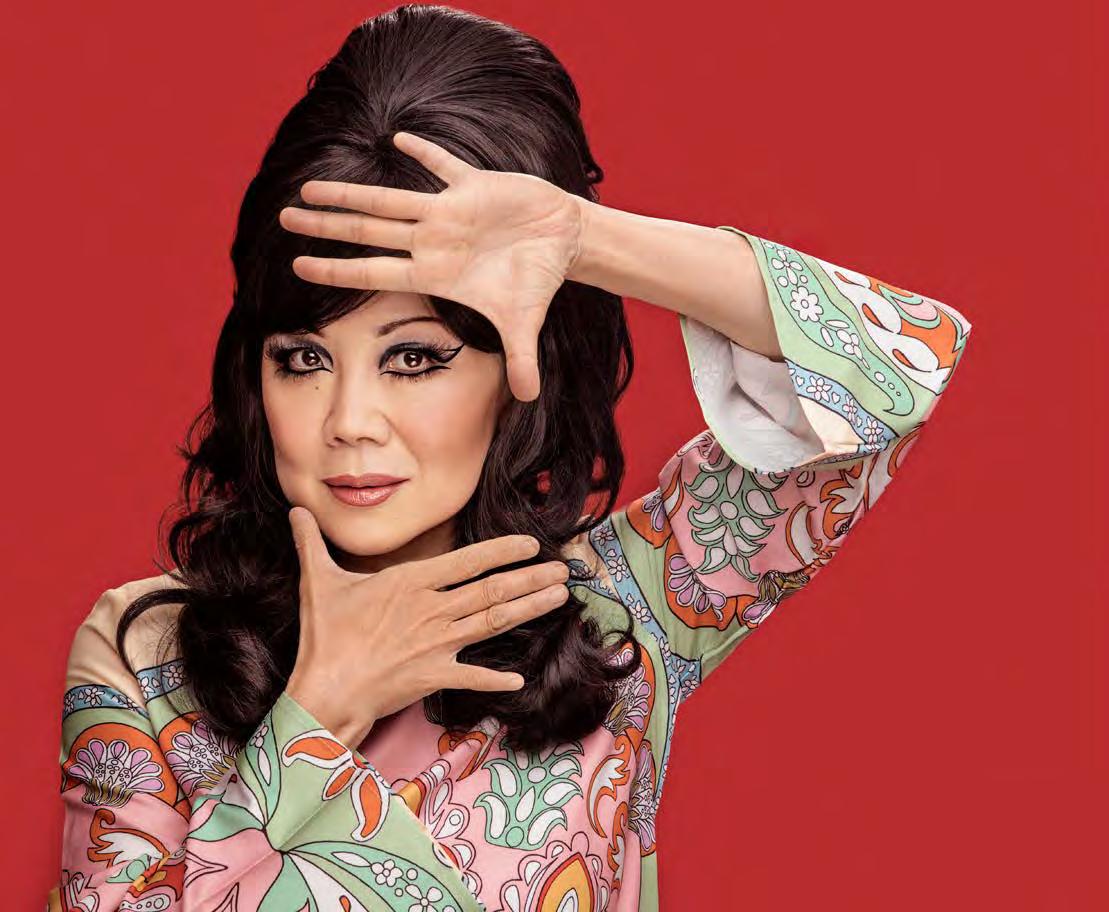








by David-Elijah Nahmod




Gloria Gaynor soared to the top of the music charts in 1978 when she released the disco anthem “I Will Survive.” The song is a testament to empowerment as the female protagonist discovers that she’ll not only survive, but thrive after an initially devastating breakup. The song went all the way to number one and quickly became a disco standard. “I Will Survive” particularly resonated with gay men who were facing a great deal of societal rejection at the time, and Gaynor became something of a gay icon.

Gaynor scores a major hit with “Never Can Say Goodbye,” not her first single but her first to achieve widespread acclaim and popularity. The film follows her life as she injures her back after falling off the stage during a performance. The injury temporarily paralyzes her, requiring her to undergo both surgery and extensive physical therapy in order to regain her mobility.
The Los Angeles Blade covers Los Angeles and California news, politics, opinion, arts and entertainment and features national and international coverage from the Blade’s award-winning reporting team. Be part of this exciting publication serving LGBT Los Angeles from the team behind the Washington Blade, the nation’s first LGBT newspaper. From the freeway to the Beltway we’ve got you covered.
On February 8, cable TV channel Lifetime will celebrate Gaynor’s life and legacy with a world premiere double feature. The first is a scripted drama titled “Robin Roberts Presents: I Will Survive: The Gloria Gaynor Story” and the second is a documentary titled “Gloria Gaynor: I Will Survive.” Though the documentary is the better film of the two, both films are worth seeing in order to get a complete picture of who Gaynor is.
Dramatized
“I Will Survive: The Gloria Gaynor Story” stars Joaquina Kalukango as Gaynor, who does a good job of capturing the singer’s spirit. The storyline opens in New Jersey in 1968 with her mother telling the young Gaynor and her sister to “keep God in your life.”
Mom dies soon after and the girls are devastated. Gaynor deals with her grief by pouring herself into her work, which at that point is singing with a little-known band titled City Life. They work well together, but when Gaynor lands a recording contract, the band is pushed into the background.
She also falls in love with a man (Lance Gross) who becomes both her husband and her manager. At first, they have a loving relationship, but things go south when he takes complete control of her life and begins “partying” with other women. He refers to this as “networking.”
The marriage ends and Gaynor rediscovers her faith in God, hiring a new manager (Francesca Bianchi) who becomes a close friend. But things take a tragic turn when she is forced to face her sister’s brutal murder.
The film recounts these pivotal events in Gaynor’s life in a fairly straightforward manner. All of Gaynor’s hits are heard on the soundtrack, but the film makes no mention of Gaynor’s sizable gay fanbase. But the supporting cast offer memorable performances. Gross is particularly good as he gradually transforms from a sweet, caring spouse to a sleazeball who only cares about the big bucks that Gaynor makes on the concert circuit.
“Good Morning America” anchor Robin Roberts and Gaynor herself serve as co-executive producers. The film does a good job of recreating the most pivotal moments in Gaynor’s life. It’s an entertaining film, but for a more complete picture of who the singer is, the documentary is essential viewing.



by Jim Gladstone
After more than ten years of development, “Froggy” is leaping to life. The narratively ambitious, technically complex theater piece, which premieres in a Center Rep production at Walnut Creek’s Lesher Center for the Arts on February 9, has polliwogged its way through over a decade of workshops and development, continually morphing toward a final form.
Steeped in pop cultural references, brand names, and video games, “Froggy” reflects the world (and the mind) of its title character, a young woman who’s been ghosted by her boyfriend and is haunted by her past.
Bracingly inventive in its storytelling and stagecraft, “Froggy” turns introspection inside out, taking audiences on a rollicking guided tour of its protagonist’s sometimes disturbing thoughts.
Frames of reference
“Froggy”’s origins lie in a challenge that playwright Jennifer Haley posed to herself.
Haley, who has written for Netflix’s “Mindhunter” and whose creepy “The Nether” ran at the San Francisco Playhouse in 2016, wanted to write a script that took advantage of the fractured, perspective-shifting narrative style she enjoyed in graphic novels.
To push herself in that direction, she drafted the original version of “Froggy” using InDesign, software primarily used to create page layouts, rather than a word processing program.
The pages of the resulting script featured comic book-style panels with snatches of dialogue, stage directions, and visual descriptions interspersed among them.
The format helped convey a sense of overlapping activity taking place in alternate realms:
Froggy, the main character, could be playing a video game at home, while her in-game avatar stalked the mean streets of a gritty urban milieu.
A scene in which present-day Froggy was driving could take place in parallel with a vividly remembered episode from her childhood, or an imagined scene from her daydreams.
While none of this would be impossible to achieve with relatively conventional theatrical means, Haley’s script demanded something that would give its simultaneities the eerie, sometimes

disorienting blur of contemporary life. How could stagecraft create a sense that scenes were perpetually emerging, subdividing, and eliding across a single character’s consciousness—and subconsciousness?
Interior design Jared Mezzocchi, the production’s Director of Creative Technology, an Obie-winning multimedia designer and a playwright himself, said he hopes that the show doesn’t feel like it’s been written, but that it’s happening in real time.
psychiatrist is wondering, ‘Well, why is he drawing it that way? Why are there vicious and rigid lines as opposed to soft and bubble figures?’
“Everything on stage is an extension of Froggy’s psychology.
Matt Morrow, the show’s director, who is also the Artistic Director of Center Rep.


The story, he said, is coming from Froggy, who, largely unbeknownst to herself is processing past traumas over the span of the play. The audience is watching a mind, alive.



“Every single sound, video projection, and lighting cue stems from Froggy herself,” Mezzocchi said in an interview with the Bay Area Reporter.
“You know those scenes where you have a kid in a psychiatrist’s office doodling?” he asks, referring to an archetypal movie moment, “The
If a scene is in saturated colors and then it feels like there’s a jump cut to desaturated colors, something’s going on with her. What? Is she going through some grief here? Why is there a mood swing? All of the external aesthetics are there to help the audience better see Froggy’s interior.”
It’s immersive theater, but rather than being immersed in the setting, you’re immersed in a character’s psyche.
“Even though the play is introspective, people will feel like they’re on an adventure with ‘Froggy’,” says

“Froggy grew up watching westerns and war movies with her father, and so she grew up with this notion of an American hero. I think the play is very much about her casting herself as the hero in her own story,” Morrow said in an interview with the Bay Area Reporter.
“We’re going into interior landscapes, but we’re doing it in such a hyperkinetic way. I want people to feel thrilled by it. It should feel like a joyride that goes into some dark places.”t
‘Froggy,’ Feb. 9-Mar. 2. $25-$78. Lesher Center for the Arts, 1601 Civic Drive, Walnut Creek. www.lesherartscenter.org
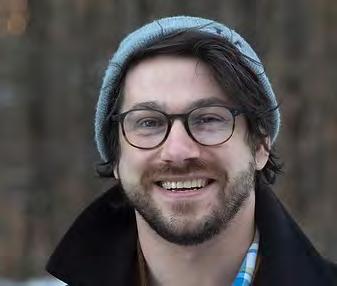
by Tim Pfaff
Samson Tsoy’s “debut” recording, “Inmost Heart: Bach, Brahms, Busoni & Reger” (Linn Records) is far more than a calling card. Where many artists issuing first recordings content themselves with sampler programs that show off their versatility, Tsoy has weighed in with a program that takes a compelling view of a central aspect of the music of Johannes Brahms.
His program considers both Brahms’ deep devotion to the music of the Baroque and his successors’ artistic debt to Brahms. Even the “pure” Brahms on his program –that is, Brahms without commentary by other composers– nods to Baroque music at its greatest.
The tribute is clear in Brahms’ “Variations and Fugue on a Theme by Handel.” It’s paired with Brahms’ transcription of the towering Chaconne from Bach’s second soloviolin partita, which Brahms tailored for the left hand alone.
Max Reger’s transformation of Brahms’ aptly named “Four Serious Songs,” Op. 121, weaves the vocal line into significantly enhanced keyboard accompaniments. Finally, Brahms’ all too seldom heard final collection, the “Eleven Chorale Preludes” of Op. 122, is represented by the six that were arranged for piano by Ferruccio Busoni. They infiltrate the recording, serving as markers and intermezzos for the other pieces.
Throughout, what listeners experience, beyond Tsoy’s virtuosity at age 36, is his full maturity as a musician. His steady focus and unflagging concentration pay off in a program that richly rewards repeated listening.
Stepping out
At a more sentimental level, “Inmost Heart” proves conclusively that musically Tsoy is his own man. The

Kazakh, London-based pianist (“soy” is a close pronunciation of his name) met fellow pianist Pavel Kolesnikov when both were students at the Moscow Conservatory. Now life partners as well as regular musical collaborators, both men have individual careers balanced by playing as a duo.
To date, Kolesnikov has had the flashier career, with numerous, critically acclaimed recordings and a roster of appearances including his celebrated performance of Bach’s “Goldberg Variations” in the cavernous Royal Albert Hall for a spellbound audience at the BBC Proms.
For his part, Tsoy now enjoys his own vigorous concert schedule, with appearances as attention-getting as performing both Brahms piano concertos on the same program. The two

Documentary
“Gloria Gaynor: I Will Survive” covers much of the same ground as the drama, the marriage gone sour, the rediscovery of faith, the loss of Gaynor’s sister and the fall which caused her decades of back pain. But the documentary also includes many anecdotes from Gaynor’s life that were not included in the scripted drama. Stories that are told in the doc include “I Will Survive” being archived by the Library of Congress, examples of how “I Will Survive” inspired

people, and Gaynor’s gay fan base. In one sequence Gaynor is at a public event during which two gay men are interviewed. One says that the song empowered him as a gay man and a person of color, while the other says that “I Will Survive” moves him as a person who survived 30 years of living with HIV.
Mainly, the documentary illustrates the challenges that Gaynor faced while trying to record a gospel album in her 70s. It was a project that no record label was interested in, yet Gaynor, over a period of several years, persevered. By the sheer force of her will power, she finishes the album which she calls “Testimony.” It was released to rave reviews and won Gaynor her second Grammy.
“Gloria Gaynor: I Will Survive” is a superb documentary that covers a lot of ground and keeps the viewer engaged. Gaynor is a decent woman who survived the many challenges in her life with grace and dignity. The documentary ensures that her story is told and preserved for all time.t
Robin Roberts Presents: ‘I Will Survive: The Gloria Gaynor Story,’ premieres February 8, 8pm. ‘Gloria Gaynor: I Will Survive,’ February 8, 10pm (and in select theaters Feb. 13 only); both on Lifetime. www.mylifetime.com www.gloriagaynoriwillsurvivemovie.com
ond solo partita for solo violin. Using only the notes of the original “noteto-note tracking” in Tsoy’s words, it tracks Bach’s towering, quarter-hour tour de force with music confined to the pianist’s left hand. Stripped of exhibitionism for its own sake, Tsoy’s astonishing performance capitalizes on the piece’s fundamental austerity, making its journey to musical high drama seem as inevitable as it is right.
Brahms’ “Handel Variations” salute the Baroque master in an absorbing series of variations that seem to toggle between the 18th and 19th centuries. It’s bright, engaging music that balances the two aesthetics with fidelity to their native idioms. There’s a fine filagree in the earlier music, and Tsoy dispatches it with unerring precision and unflagging energy. The thunderous fugue that concludes the variations is Brahmsian as much as Bachian, and Tsoy adds to that a clear-minded exuberance all his own.
regularly perform and record as a piano duo, as seen in their much-lauded recent recording of Schubert duets.
But at least in the US, Tsoy’s reputation has been somewhat eclipsed by Kolesnikov’s. Fame has had its way of suggesting, erroneously, that Kolesnikov has been the star musician and Samson an also-ran. But “Inmost Heart” is not a debut CD in the usual sense, and it may need saying that it is a first solo recording and not a calling card. The album declares not only that Samson is musically his own man but also that he has a remarkable artistic profile all his own.
Little music made big
The central piece on Tsoy’s program is the Bach-Brahms’ transcription of Bach’s famous Chaconne from his sec-
Along the way he proves himself a wizard of the diabolical repeated note and the weight of what is too often passed off as mere ornament. Throughout this disc Tsoy displays a keen sense of period styles matched with an unmistakable lust to entertain in the fullest sense.
The “Four Serious Songs,” Brahms’
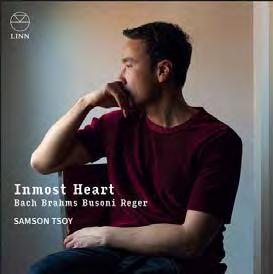
penultimate work, would not seem ripe for translation into solo-piano music, but against the odds Max Reger’s arrangements locate the new in the old. The solemnity of the deathdrenched texts Brahms set is offset by music of sometimes wild invention. Tsoy’s recognition of the songs’ essential Brahms-ness makes Reger’s flights of fancy all the more involving. Brahms last opus, the “Eleven Chorale Preludes” for organ, is similarly absorbed with imminent death, but in the place of drama in the usual sense is an austerity of means all its own. The likelihood that you’ll hear these pieces live is close to nil, but pianists have long treasured the six that Busoni arranged for the piano keyboard. Together, these chorale preludes, with their clear debt to Bach, ache with quiet transcendence.
Tsoy begins with “Hertzlich tut mich verlangen,” arguably the best known of Busoni’s arrangements, and what immediately catches the ear is the pianist’s mastery at sounding out the inner voices, so conspicuous and vital in the Bach originals. The overlay of Brahms on Bach produces moving but often technically hazardous crossrhythms, to which Tsoy responds with an inwardness all his own.
With deceptive simplicity, the chorale preludes, resurface throughout Tsoy’s program, introducing and summarizing it as a whole and setting off the individual works with music of longing and quiet terror.
For its part, Linn Recordings has wrapped the package with an exemplary capture of the piano sound, no mean achievement ever. No mere debut album, “Inmost Heart” is a keeper.t
‘Inmost Heart: Bach Brahms Busoni & Reger,’ Samson Tsoy, pianist, CD and streaming. www.linnrecords.com lnk.to/InmostHeart_TsoyFA

FEBRUARY 6 - MARCH 2, 2025
by David-Elijah Nahmod
The new anthology book “Access-
ing Parenthood: Stories by and About Parents With Disabilities” calls attention to an often overlooked segment of the disabled population. The book is thin, a mere 124 pages, yet it carries a lot of emotional weight. The publisher is Oleb Books, a small press which only publishes works by writers with disabilities.
“Accessing Parenthood” was edited by the late Susie Angel and Laura Perna of the Coalition of Texans With Disabilities, an advocacy group in the Lone Star State. Angel tragically did not live to see the book’s publication as she passed away from cancer shortly before it was completed. The book is dedicated to her memory.
The book’s layout is simple. After a forward by the editors there are nine short memoir pieces written by nine authors who share their disability journey. A variety of disabilities are represented, including visible disabilities like multiple sclerosis and invisible disabilities such as depression. Each author writes candidly about the challenges they face in their daily lives.
Stories are told both from the point of view of living with a disability while raising children, and from the vantage point of being a child with a disabled parent. In “Coloring Unicorns and Popping Wheelies,” Jennifer Heettner recalls a childhood in which she asked why her mother was in a wheelchair. She had been told by her father that her mother was injured after falling into a manhole.
Heettner writes eloquently about having to be cautious when she

touched her mother so as not to hurt her. But as her friends kept asking her what was wrong with her mother, Heettner knew that something was amiss, that her parents weren’t being honest with her. Finally, they told her the truth. Her mother had a disease, multiple sclerosis. Also included is a piece by a disabled mom whose son shares her disability. In “Three Days Before the Witches Fly,” Suzanne Nielsen writes about how she has dealt with her lifelong battle against severe, debilitating depression. There’s an ironic twist to Nielsen’s tale. She is the mother of two sons, one of whom also lives with depression.


New anthology shines a light on parents with disabilities

Moving honesty
Two of the authors fall under the LGBT umbrella. One is Dylan Ward, a hearing-impaired gay man who lives with his husband and son. In “Hearing My Son’s World,” Ward expresses his frustration at not being able to hear the world as his son hears it. Though with the help of a hearing aid he has some hearing in one ear, he is often unable to decipher the sounds around him. When they’re in the family car he often cannot hear what his son says from the back seat. When they’re at the playground he finds it difficult to connect with other parents. Ward shares these anecdotes, and others, with a candor that is brutally honest and moving.
“I don’t think it was difficult to share this story,” Ward wrote in an email interview with the Bay Area Reporter. “I am much better at sharing personal truths through writing than I am in any other way. I think writing this piece really helped me to process some of the frustrations and self-doubt I was feeling at the time, especially as a newer parent; but also, as a person with a disability who struggles a little bit more than the average parent.”
Ward added that his husband has yet to read his story, though he plans to share the piece with his husband in the near future. His son also hasn’t read the piece.
“But I hope he will someday,” Ward said of his son. “I’ll probably introduce the piece to him, along with my other writing at some point, and let him discover it, and hopefully appreciate it, on his own terms. This is a goal I have as my son gets older, to let him see what I do as a writer and how I express myself through it.”
Ward hopes that people who read his story will understand that while parenting is difficult for anyone, it is often much harder for parents with disabilities. He said that he tries not to let his disability be a hindrance. Challenges and all, he loves being a parent and loves watching his son grow up to find his own independence and understanding of the world.
“I guess one thing I’d like the general public to know is that being deaf or hard-of-hearing is simply a part of who I am and while sometimes I wish I could hear normally, there are times I appreciate and experience the world in my own unique way,” he said. “Understanding my limitations goes a long way in showing respect toward me as a person.”
Another particularly moving story in the anthology is “Little Stuffed Grape Leaf” by Lou Evlalia, who is nonbinary. Evlalia lives with Ehlers Danlos Syndrome, a connective tissue disorder which can cause a person’s skin to be stretchy, and also leave a
person with limbs that are loose and hyperextensible. This can cause the limbs to easily dislocate.
There are other symptoms of the condition, which can be quite painful. Evlalia, who prefers to go by they/ them pronouns, does in fact live with constant pain. They live with their child and partner, and wrote beautifully about the frustrations of taking part in family outings to the beach while using a wheelchair and cane. They also write about how their life was changed by the disability justice movement.
“That EDS and connective tissue differences in general are actually really common and look a lot of different ways,” Evlalia said in an interview with the BAR. “It’s twice as common in people of color but white people but white people make up 98% of the diagnosed population.
So just having an EDS diagnosis is a privileged thing, despite the years of medical abuse and neglect I’ve experienced. Even though there is more research and understanding happening because of the overlaps with long COVID, medical racism and care
neglect in this population is rampant.”
Evlalia hopes that their message of disability justice and parenting will touch readers deeply.
“Disability can be a beautiful part of life, parenting and family,” they said. “I want to hear their disabled stories too. I wanted to share my journey with internalized ableism, and realize that I was still in the middle of it while I was writing it. Learning about disability justice lineages through Sins Invalid (a disability justice-based movement and performance project that celebrates disabled people. It’s led by Black, indigenous, queer, trans and nonbinary disabled people) was the key to opening a whole new disabled life for me. I hope readers will seek out and uplift the incredible offerings from leaders and teachers of this robust movement.”t
‘Accessing Parenthood: Stories by and About Parents With Disabilities,’ Edited by Susie Angel, Laura Perna, with Belo Cipriano. 124 pages. $12.95 paperback, $4.95 Kindle. Oleb Books. www.olebbooks.com



I remember seeing that tour in Chicago.
I’m so lucky to be able to have worked with my divas from the ’80s who are still amazing. Of course, I think The Go-Go’s are it! That was the first concert that I ever went to and they’re all friends of mine. They’re artists that just keep on giving. They keep on doing it, and I love that.
I was excited to hear your cover of Freur’s “Doot Doot,” which is not a song that has been covered by many other artists. Why did you choose to include that song?
The keyboards and the handclaps on “Sisyphus” give the song an ’80s vibe. Of all the music you’ve listened to during your lifetime, where does music from the 1980s rank on your list?
It’s huge! If I were to stick with one era, it would be the ’80s. I think it was such a great time for music because we had technology really changing the way that musicians were working and writing. Using synthesizers in a different way. Using all sorts of computers in a different way. I love New Wave! I think that era was so powerful. I also have had a chance to work with my favorite artists from the era, whether that’s Blondie, Cyndi Lauper, or Joan Jett on the True Colors Tour.
I love that song! That’s like the ultimate blend of ’80s technology and the new idea of where we’re going to approach rock and roll. I find that song to be so moving. You can kind of paint any situation onto it. We don’t really know what it’s about. It could be anything, and I love that about that song.
“Funny Man” and its accompanying music video are a loving tribute to Robin Williams. There’s a line in the song that goes, “You always got my name wrong.” Can you please say something about that?
He thought my name was Margaret Chow, which is so funny. He did so for about 40 years. He had it stuck in his mind that that’s what it was. It was so hilarious. I guess he thought I was

Italian. I love him. I miss him. I want people to remember him. We don’t talk about his legacy in comedy enough, I think because of the terrifying, uncomfortable way that he decided to leave. This is a good way to remind everybody of him and what he meant. Also, to talk about funny people who don’t necessarily feel great.
I’m glad you mentioned that because you describe the song as “an anthem to the funny guys who didn’t always feel so funny on the inside.” Do you think there’s a public misconception about the performer they see on stage and what that performer’s life is like offstage?
Yes. I think, especially for comedians, the idea is that we’re relied upon to be funny and always be on. The fact is that comedy or a sense of humor is a coping mechanism. Oftentimes people are really funny, but they also have a lot to cope with. They have that sense of humor because they’ve had to deal with so much trauma throughout their lives. People have an idea that comedy is about happiness and it’s kind of not. It’s really interesting. I want to spread that idea.
My personal favorite song on the album is “You Can Be You,” on which you are joined vocally by Garrison Starr. Please tell the readers about how that song came to be.
That song was written on the day that Nex Benedict died. Nex Benedict was a non-binary, gender non-conforming teen from Oklahoma who was failed by the state of Oklahoma, the Board of Education, the students, the teachers, and the staff at the school they attended. The incredible inhumanity of people, the constant misgendering, the constant mockery of this young person’s life really made me so angry. I wanted to write a song that spoke to non-binary youth, nonbinary teens, queer teens, trans teens, who are struggling with the onslaught of homophobia and transphobia from our current administration and the country at large. It’s a terrible time. I wanted to have a song that was speaking to them; that was about letting them be themselves, allowing them to be them. That was a really important thing to me. Embracing pronouns. Embracing the idea that they don’t have to be gender-conforming. You can be yourself. There was such a feeling of hopelessness after Nex’s death, that I didn’t know how to address it. The song is meant for that.
Your “Live and Livid” tour is now in its second year. Would you say that in early 2025 you are as livid as you were or livider than ever?


I’m so livider. I’m so livided [laughs]! It’s so scary. But I think we have to have more hope than ever. Through humor, there is hope. Laughter is resistance. There’s a way to talk about things so that we can survive that. I’m putting all of my effort into writing about what’s happening, talking about what’s happening. Making sure that we can
fight this injustice, this homophobia, this hatred, this transphobia. It’s a nightmare, but I think we have to use humor to get through it.
Do you plan to incorporate songs from “Lucky Gift” into your show, or are there plans for a separate concert tour? I want to do something separate. I haven’t exactly figured out what that is. For me, it’s so different, so I would love to try to figure that out. I’m just in the process of doing that. There’s some music shows that I’m doing now and that will expand as we go along. Right now, the record is just coming out, so I want to see what happens. But I definitely want to do music, and of course, comedy.
Earlier we talked about ’80s music, and I was wondering if you recorded another music album, might you include a cover of the Greg Kihn Band song “Jeopardy” in honor of your recent game show triumph?
Ooh! I would love that. That would be great. I loved him. He’s a San Francisco hometown rocker. I think that would be absolutely perfect!t
Margaret Cho performs March 28 at the Sunset Center in Carmel by The Sea, and March 29 at the Performing Arts Center, San Luis Obispo. www.margaretcho.com






